

Personal Reflection Sample: preparing a Research Report for ACCA
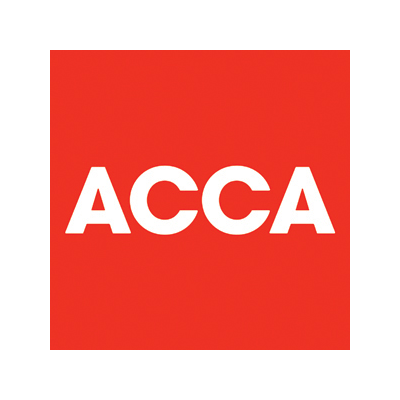
The skill and learning statement includes the implications of interactions with mentor, an analysis of the extent to which research questions have been answered, a brief analysis of interpersonal and communication skills and their relevance to the research, as well as the contribution of the research experience to my professional and personal development.
1. Experiences of interactions with mentor
I had chances of meeting my project mentor three times and obtained practical support regarding various aspects of the work during these meetings. Our first meeting was mainly dedicated to clarifying our expectations from the research experience and the discussions took place related to the issues of selection of the research approach and formulation of research questions and objectives.
By the time I had a meeting with my mentor for the second time Introduction and Information gathering chapters of the work have been completed and I received detailed feedback for these chapters of the research. Also, discussions were held about data analysis and presentation associated with the project.
During the final meeting with my mentor the overall work has been scrutinised and a set of specific points have been mentioned by my mentor. Specifically, my mentor raised a point that my discussions of research findings lacked depth and scale. Then, these points have been addressed and the final draft of the Research Report was completed.
I found advices given by my mentor very helpful in terms of increasing the quality of my Research Report and equipping me with knowledge of effectively conducting similar studies in the future in general. Moreover, my Project Mentor was not only highlighting the shortages that were associated with my project, but also was giving detailed explanations why these changes were desirable in a passionate manner.
Furthermore, I found these three sessions with my mentor to be highly motivational and informative experience because they have increased the level of my personal interest in conducting businesses studies. Prior to conducting the Research Report and having discussions with my mentor I was assuming conducting analytical business studies to be a rather boring experience.
However, thanks to my mentor I learned to appreciate the importance of analysing a business case in terms of identifying a current strategic and financial position of a business, and formulating the ways of identifying further strategic options available to the business.
2. The extent to which research questions have been answered
Answering the research questions in my Research Report were directly related to the quality of secondary data, and the choice of methodology. Therefore, these issues were approached effectively by critically assessing the validity of the sources of secondary data and assessing alternative choices of methodology. Moreover, my first meeting with my Project mentor was mainly devoted to the discussion of the same issues.
As a result of comprehensive analysis the most reliable sources of secondary data in order to be used in Research Report were found to include published financial statements and annual reports, textbooks on financial and business analysis, information published in official company website, information available from ACCA website, as well as, various business journals an newspapers.
The choice of methods for conducting the study, on the other hand, was guided by the reliability of the data analysis methods and their relevance to the research issues. After spending additional amount of time for the choice of appropriate methodology and taking into account advises of my mentor, financial ratios and analytic tools have been chosen to be employed in my Research Report.
Purposely, financial and accounting ratios that were used in the study include profitability, liquidity, financial position and investor ratios, whereas, the choice of analytic tools consist of SWOT, PESTLE, and Porter’s five forces analysis.
To summarise this part, it is fair to state that all of the research questions in my Research Report have been effectively addressed, because the secondary data have been obtained from reliable sources, relevant methodology has been used to conduct the study, and the research findings have been critically discussed.
3. Interpersonal and communication skills and their relevance to the research
I have demonstrated my interpersonal and communication skills at various stages of doing Research Report and preparing for and making the presentation. Moreover, without my interpersonal and communication skills completing the Research Report and doing the presentation would have proved to be highly challenging.
For example, my listening skills have proved to be highly valuable in terms of understanding vital information given by my mentor about increasing the quality of my Research Report, because these advises were fully understood and implemented into the practice.
My interpersonal skills have also played a positive role when I asked some of my trusted colleagues to be an audience when I was rehearsing my presentation. I was making presentations in front of my colleagues and was asking for their opinions about the quality of my presentation. This practice took place many times in different settings and I believe that following this strategy has enhanced the quality of my presentation and my marks.
However, my communication skills have played a crucial role in terms of succeeding in making the presentation effectively. I have learned from my experiences within and outside of academic settings that communication skills play the most crucial role in terms of succeeding in personal and professional lives.
For instance, an individual may possess a deep knowledge about a certain area. However, if the individual lacks competency of communicating his or her ideas, knowledge and feelings in an effective manner, the overall competency of the individual and the level of his or her contribution to the organisation will always remain compromised.
Therefore, in my opinion, regardless of the field, industry or type of organisation, communication skills can be specified as a compulsory attribute for an employee in order to be considered an a competent. In my case in particular, my advanced level of communication skills have enabled me to do my Research Report presentation effectively which has resulted in positive acclaim from my peers and mentor.
4. The potential contribution of Research Report to the level of professional development
Conducting the Research Report and doing the presentation has increased the level of my professional competency in several ways. First of all, I have to mention the fact that I have developed a critical mindset towards solving business issues as a result of conducting the Research Report.
My mentor made it clear that it was important to critically analyse related issues in Research Report rather than just offering description of the issues and supplying calculations. The mentor had stressed many times that critical analysis and discussions are the elements of the work that increase its value. For the same reason I had to revise my Research Report several times until my mentor was satisfied with the level of critical analysis the work had included.
Although, such an approach to work seemed to be very challenging and confusing during the research process, I appreciated the value of critical analysis once the final work was completed. The skills of critical analysis that I have developed and applied in Research Report can easily be applied when real business issues would need to be resolved by me in the future in my professional capacity.
Completing the Research Report was similar to project management in real businesses environment in terms of strict deadlines, scarcity of resources, organising and planning, scheduling meetings, doing presentations etc. Therefore, the skills I developed during the process of completing Research Report can be used in order to successfully manage business projects in the future.
Moreover, my writing skills have also been greatly improved as a result of engaging in Research Report. Despite the popular opinion that with the increasing importance of information technology the practice of writing letters and reports are being replaced by alternative means of business communications, the importance of writing will always remain significant for business managers.
From this point of view engaging in Research Report was a very beneficial experience for me on a personal level. Specifically, writing the paper of almost ten thousand words in total, including this personal reflection, has made me better prepared to join the full-time workforce once my studies are completed.
Lastly, as a result of preparing the Research Report my professional interest on the issues associated with corporate strategy has been enhanced. Moreover, I am planning to continue studying the issues of corporate strategy and that knowledge would benefit me in the future as a corporate leader.
5. Gains derived from conducting Research Report experience on a personal level
On a personal level I benefited from conducting the Research Report and doing the presentation in a number of ways. The research experience with Oxford Brookes has increased the level of my motivation for studying, making bold plans for my future career and implements necessary measures and initiatives in order to accomplish these plans. My mentor deserves to be mentioned here specifically for all encouragements and practical tips that can be applied in various alternative settings apart from academic life.
The level of my self-confidence has also been increased because I could complete the Research Report in time. Moreover, the presentation experience has increased the level of my self-confidence dramatically, because I understood that if I could do a successful presentation in front of my mentor and colleagues, doing the presentations of multi-million projects in front of top executives was just a matter of time.
The paramount importance of self-confidence for an individual is an undisputable matter. Self-confidence allows us to set ambitious plans and utilise all the available resources efficiently in order to achieve these plans.
My time-management skills have also been improved by the end of the Research Report. This is because there was a specific deadline for both, the Research Report and presentation and I had to adopt some principles related to time management in order to be able to submit my work on time.
These principles included setting specific deadlines for each chapter of the work, and above all, dramatically cutting the amount of time I used to browse social networking sites on the internet. I can highlight this fact as one of the most substantial gains in a personal level. This is because prior to the research experience I used to spend several hours a day browsing a set of social networking sites with no real benefit whatsoever. However, once the priority was given to the Research Project, this bad habit was dealt with effectively and irreversibly.
6. Conclusions
To summarise, completing the Research Report and making presentation with Oxford Brookes University following my ACCA course has increased the level of my preparedness to join the full-time workforce and successfully utilise my energy and knowledge. In my opinion the biggest benefit I received from enrolling to this course of study is that the course of study, the Research Report and doing the presentation have made me to believe in my skills and capabilities and they have also awoke my desire to approach studying as a lifelong process.
Moreover, I have obtained a set of professional and personal gains as a result of completing the Research Report and making presentation that include the development of a critical mindset, improvement my writing and time management skills and enhancement of the level of my self-confidence.
Guide on How to Write a Reflection Paper with Free Tips and Example

A reflection paper is a very common type of paper among college students. Almost any subject you enroll in requires you to express your opinion on certain matters. In this article, we will explain how to write a reflection paper and provide examples and useful tips to make the essay writing process easier.
Reflection papers should have an academic tone yet be personal and subjective. In this paper, you should analyze and reflect upon how an experience, academic task, article, or lecture shaped your perception and thoughts on a subject.
Here is what you need to know about writing an effective critical reflection paper. Stick around until the end of our guide to get some useful writing tips from the writing team at EssayPro — a research paper writing service
What Is a Reflection Paper
A reflection paper is a type of paper that requires you to write your opinion on a topic, supporting it with your observations and personal experiences. As opposed to presenting your reader with the views of other academics and writers, in this essay, you get an opportunity to write your point of view—and the best part is that there is no wrong answer. It is YOUR opinion, and it is your job to express your thoughts in a manner that will be understandable and clear for all readers that will read your paper. The topic range is endless. Here are some examples: whether or not you think aliens exist, your favorite TV show, or your opinion on the outcome of WWII. You can write about pretty much anything.
There are three types of reflection paper; depending on which one you end up with, the tone you write with can be slightly different. The first type is the educational reflective paper. Here your job is to write feedback about a book, movie, or seminar you attended—in a manner that teaches the reader about it. The second is the professional paper. Usually, it is written by people who study or work in education or psychology. For example, it can be a reflection of someone’s behavior. And the last is the personal type, which explores your thoughts and feelings about an individual subject.
However, reflection paper writing will stop eventually with one very important final paper to write - your resume. This is where you will need to reflect on your entire life leading up to that moment. To learn how to list education on resume perfectly, follow the link on our dissertation writing services .
Unlock the potential of your thoughts with EssayPro . Order a reflection paper and explore a range of other academic services tailored to your needs. Dive deep into your experiences, analyze them with expert guidance, and turn your insights into an impactful reflection paper.

Free Reflection Paper Example
Now that we went over all of the essentials about a reflection paper and how to approach it, we would like to show you some examples that will definitely help you with getting started on your paper.
Reflection Paper Format
Reflection papers typically do not follow any specific format. Since it is your opinion, professors usually let you handle them in any comfortable way. It is best to write your thoughts freely, without guideline constraints. If a personal reflection paper was assigned to you, the format of your paper might depend on the criteria set by your professor. College reflection papers (also known as reflection essays) can typically range from about 400-800 words in length.
Here’s how we can suggest you format your reflection paper:

How to Start a Reflection Paper
The first thing to do when beginning to work on a reflection essay is to read your article thoroughly while taking notes. Whether you are reflecting on, for example, an activity, book/newspaper, or academic essay, you want to highlight key ideas and concepts.
You can start writing your reflection paper by summarizing the main concept of your notes to see if your essay includes all the information needed for your readers. It is helpful to add charts, diagrams, and lists to deliver your ideas to the audience in a better fashion.
After you have finished reading your article, it’s time to brainstorm. We’ve got a simple brainstorming technique for writing reflection papers. Just answer some of the basic questions below:
- How did the article affect you?
- How does this article catch the reader’s attention (or does it all)?
- Has the article changed your mind about something? If so, explain how.
- Has the article left you with any questions?
- Were there any unaddressed critical issues that didn’t appear in the article?
- Does the article relate to anything from your past reading experiences?
- Does the article agree with any of your past reading experiences?
Here are some reflection paper topic examples for you to keep in mind before preparing to write your own:
- How my views on rap music have changed over time
- My reflection and interpretation of Moby Dick by Herman Melville
- Why my theory about the size of the universe has changed over time
- How my observations for clinical psychological studies have developed in the last year
The result of your brainstorming should be a written outline of the contents of your future paper. Do not skip this step, as it will ensure that your essay will have a proper flow and appropriate organization.
Another good way to organize your ideas is to write them down in a 3-column chart or table.

Do you want your task look awesome?
If you would like your reflection paper to look professional, feel free to check out one of our articles on how to format MLA, APA or Chicago style
Writing a Reflection Paper Outline
Reflection paper should contain few key elements:
Introduction
Your introduction should specify what you’re reflecting upon. Make sure that your thesis informs your reader about your general position, or opinion, toward your subject.
- State what you are analyzing: a passage, a lecture, an academic article, an experience, etc...)
- Briefly summarize the work.
- Write a thesis statement stating how your subject has affected you.
One way you can start your thesis is to write:
Example: “After reading/experiencing (your chosen topic), I gained the knowledge of…”
Body Paragraphs
The body paragraphs should examine your ideas and experiences in context to your topic. Make sure each new body paragraph starts with a topic sentence.
Your reflection may include quotes and passages if you are writing about a book or an academic paper. They give your reader a point of reference to fully understand your feedback. Feel free to describe what you saw, what you heard, and how you felt.
Example: “I saw many people participating in our weight experiment. The atmosphere felt nervous yet inspiring. I was amazed by the excitement of the event.”
As with any conclusion, you should summarize what you’ve learned from the experience. Next, tell the reader how your newfound knowledge has affected your understanding of the subject in general. Finally, describe the feeling and overall lesson you had from the reading or experience.
There are a few good ways to conclude a reflection paper:
- Tie all the ideas from your body paragraphs together, and generalize the major insights you’ve experienced.
- Restate your thesis and summarize the content of your paper.
We have a separate blog post dedicated to writing a great conclusion. Be sure to check it out for an in-depth look at how to make a good final impression on your reader.
Need a hand? Get help from our writers. Edit, proofread or buy essay .
How to Write a Reflection Paper: Step-by-Step Guide
Step 1: create a main theme.
After you choose your topic, write a short summary about what you have learned about your experience with that topic. Then, let readers know how you feel about your case — and be honest. Chances are that your readers will likely be able to relate to your opinion or at least the way you form your perspective, which will help them better understand your reflection.
For example: After watching a TEDx episode on Wim Hof, I was able to reevaluate my preconceived notions about the negative effects of cold exposure.
Step 2: Brainstorm Ideas and Experiences You’ve Had Related to Your Topic
You can write down specific quotes, predispositions you have, things that influenced you, or anything memorable. Be personal and explain, in simple words, how you felt.
For example: • A lot of people think that even a small amount of carbohydrates will make people gain weight • A specific moment when I struggled with an excess weight where I avoided carbohydrates entirely • The consequences of my actions that gave rise to my research • The evidence and studies of nutritional science that claim carbohydrates alone are to blame for making people obese • My new experience with having a healthy diet with a well-balanced intake of nutrients • The influence of other people’s perceptions on the harm of carbohydrates, and the role their influence has had on me • New ideas I’ve created as a result of my shift in perspective
Step 3: Analyze How and Why These Ideas and Experiences Have Affected Your Interpretation of Your Theme
Pick an idea or experience you had from the last step, and analyze it further. Then, write your reasoning for agreeing or disagreeing with it.
For example, Idea: I was raised to think that carbohydrates make people gain weight.
Analysis: Most people think that if they eat any carbohydrates, such as bread, cereal, and sugar, they will gain weight. I believe in this misconception to such a great extent that I avoided carbohydrates entirely. As a result, my blood glucose levels were very low. I needed to do a lot of research to overcome my beliefs finally. Afterward, I adopted the philosophy of “everything in moderation” as a key to a healthy lifestyle.
For example: Idea: I was brought up to think that carbohydrates make people gain weight. Analysis: Most people think that if they eat any carbohydrates, such as bread, cereal, and sugar, they will gain weight. I believe in this misconception to such a great extent that I avoided carbohydrates entirely. As a result, my blood glucose levels were very low. I needed to do a lot of my own research to finally overcome my beliefs. After, I adopted the philosophy of “everything in moderation” as a key for having a healthy lifestyle.
Step 4: Make Connections Between Your Observations, Experiences, and Opinions
Try to connect your ideas and insights to form a cohesive picture for your theme. You can also try to recognize and break down your assumptions, which you may challenge in the future.
There are some subjects for reflection papers that are most commonly written about. They include:
- Book – Start by writing some information about the author’s biography and summarize the plot—without revealing the ending to keep your readers interested. Make sure to include the names of the characters, the main themes, and any issues mentioned in the book. Finally, express your thoughts and reflect on the book itself.
- Course – Including the course name and description is a good place to start. Then, you can write about the course flow, explain why you took this course, and tell readers what you learned from it. Since it is a reflection paper, express your opinion, supporting it with examples from the course.
- Project – The structure for a reflection paper about a project has identical guidelines to that of a course. One of the things you might want to add would be the pros and cons of the course. Also, mention some changes you might want to see, and evaluate how relevant the skills you acquired are to real life.
- Interview – First, introduce the person and briefly mention the discussion. Touch on the main points, controversies, and your opinion of that person.
Writing Tips
Everyone has their style of writing a reflective essay – and that's the beauty of it; you have plenty of leeway with this type of paper – but there are still a few tips everyone should incorporate.
Before you start your piece, read some examples of other papers; they will likely help you better understand what they are and how to approach yours. When picking your subject, try to write about something unusual and memorable — it is more likely to capture your readers' attention. Never write the whole essay at once. Space out the time slots when you work on your reflection paper to at least a day apart. This will allow your brain to generate new thoughts and reflections.
- Short and Sweet – Most reflection papers are between 250 and 750 words. Don't go off on tangents. Only include relevant information.
- Clear and Concise – Make your paper as clear and concise as possible. Use a strong thesis statement so your essay can follow it with the same strength.
- Maintain the Right Tone – Use a professional and academic tone—even though the writing is personal.
- Cite Your Sources – Try to cite authoritative sources and experts to back up your personal opinions.
- Proofreading – Not only should you proofread for spelling and grammatical errors, but you should proofread to focus on your organization as well. Answer the question presented in the introduction.
'If only someone could write my essay !' you may think. Ask for help our professional writers in case you need it.
Do You Need a Well-Written Reflection Paper?
Then send us your assignment requirements and we'll get it done in no time.
How To Write A Reflection Paper?
How to start a reflection paper, how long should a reflection paper be, related articles.
%20(2).webp)
Organizing Your Social Sciences Research Assignments
- Annotated Bibliography
- Analyzing a Scholarly Journal Article
- Group Presentations
- Dealing with Nervousness
- Using Visual Aids
- Grading Someone Else's Paper
- Types of Structured Group Activities
- Group Project Survival Skills
- Leading a Class Discussion
- Multiple Book Review Essay
- Reviewing Collected Works
- Writing a Case Analysis Paper
- Writing a Case Study
- About Informed Consent
- Writing Field Notes
- Writing a Policy Memo
- Writing a Reflective Paper
- Writing a Research Proposal
- Generative AI and Writing
- Acknowledgments
Reflective writing is a process of identifying, questioning, and critically evaluating course-based learning opportunities, integrated with your own observations, experiences, impressions, beliefs, assumptions, or biases, and which describes how this process stimulated new or creative understanding about the content of the course.
A reflective paper describes and explains in an introspective, first person narrative, your reactions and feelings about either a specific element of the class [e.g., a required reading; a film shown in class] or more generally how you experienced learning throughout the course. Reflective writing assignments can be in the form of a single paper, essays, portfolios, journals, diaries, or blogs. In some cases, your professor may include a reflective writing assignment as a way to obtain student feedback that helps improve the course, either in the moment or for when the class is taught again.
How to Write a Reflection Paper . Academic Skills, Trent University; Writing a Reflection Paper . Writing Center, Lewis University; Critical Reflection . Writing and Communication Centre, University of Waterloo; Tsingos-Lucas et al. "Using Reflective Writing as a Predictor of Academic Success in Different Assessment Formats." American Journal of Pharmaceutical Education 81 (2017): Article 8.
Benefits of Reflective Writing Assignments
As the term implies, a reflective paper involves looking inward at oneself in contemplating and bringing meaning to the relationship between course content and the acquisition of new knowledge . Educational research [Bolton, 2010; Ryan, 2011; Tsingos-Lucas et al., 2017] demonstrates that assigning reflective writing tasks enhances learning because it challenges students to confront their own assumptions, biases, and belief systems around what is being taught in class and, in so doing, stimulate student’s decisions, actions, attitudes, and understanding about themselves as learners and in relation to having mastery over their learning. Reflection assignments are also an opportunity to write in a first person narrative about elements of the course, such as the required readings, separate from the exegetic and analytical prose of academic research papers.
Reflection writing often serves multiple purposes simultaneously. In no particular order, here are some of reasons why professors assign reflection papers:
- Enhances learning from previous knowledge and experience in order to improve future decision-making and reasoning in practice . Reflective writing in the applied social sciences enhances decision-making skills and academic performance in ways that can inform professional practice. The act of reflective writing creates self-awareness and understanding of others. This is particularly important in clinical and service-oriented professional settings.
- Allows students to make sense of classroom content and overall learning experiences in relation to oneself, others, and the conditions that shaped the content and classroom experiences . Reflective writing places you within the course content in ways that can deepen your understanding of the material. Because reflective thinking can help reveal hidden biases, it can help you critically interrogate moments when you do not like or agree with discussions, readings, or other aspects of the course.
- Increases awareness of one’s cognitive abilities and the evidence for these attributes . Reflective writing can break down personal doubts about yourself as a learner and highlight specific abilities that may have been hidden or suppressed due to prior assumptions about the strength of your academic abilities [e.g., reading comprehension; problem-solving skills]. Reflective writing, therefore, can have a positive affective [i.e., emotional] impact on your sense of self-worth.
- Applying theoretical knowledge and frameworks to real experiences . Reflective writing can help build a bridge of relevancy between theoretical knowledge and the real world. In so doing, this form of writing can lead to a better understanding of underlying theories and their analytical properties applied to professional practice.
- Reveals shortcomings that the reader will identify . Evidence suggests that reflective writing can uncover your own shortcomings as a learner, thereby, creating opportunities to anticipate the responses of your professor may have about the quality of your coursework. This can be particularly productive if the reflective paper is written before final submission of an assignment.
- Helps students identify their tacit [a.k.a., implicit] knowledge and possible gaps in that knowledge . Tacit knowledge refers to ways of knowing rooted in lived experience, insight, and intuition rather than formal, codified, categorical, or explicit knowledge. In so doing, reflective writing can stimulate students to question their beliefs about a research problem or an element of the course content beyond positivist modes of understanding and representation.
- Encourages students to actively monitor their learning processes over a period of time . On-going reflective writing in journals or blogs, for example, can help you maintain or adapt learning strategies in other contexts. The regular, purposeful act of reflection can facilitate continuous deep thinking about the course content as it evolves and changes throughout the term. This, in turn, can increase your overall confidence as a learner.
- Relates a student’s personal experience to a wider perspective . Reflection papers can help you see the big picture associated with the content of a course by forcing you to think about the connections between scholarly content and your lived experiences outside of school. It can provide a macro-level understanding of one’s own experiences in relation to the specifics of what is being taught.
- If reflective writing is shared, students can exchange stories about their learning experiences, thereby, creating an opportunity to reevaluate their original assumptions or perspectives . In most cases, reflective writing is only viewed by your professor in order to ensure candid feedback from students. However, occasionally, reflective writing is shared and openly discussed in class. During these discussions, new or different perspectives and alternative approaches to solving problems can be generated that would otherwise be hidden. Sharing student's reflections can also reveal collective patterns of thought and emotions about a particular element of the course.
Bolton, Gillie. Reflective Practice: Writing and Professional Development . London: Sage, 2010; Chang, Bo. "Reflection in Learning." Online Learning 23 (2019), 95-110; Cavilla, Derek. "The Effects of Student Reflection on Academic Performance and Motivation." Sage Open 7 (July-September 2017): 1–13; Culbert, Patrick. “Better Teaching? You Can Write On It “ Liberal Education (February 2022); McCabe, Gavin and Tobias Thejll-Madsen. The Reflection Toolkit . University of Edinburgh; The Purpose of Reflection . Introductory Composition at Purdue University; Practice-based and Reflective Learning . Study Advice Study Guides, University of Reading; Ryan, Mary. "Improving Reflective Writing in Higher Education: A Social Semiotic Perspective." Teaching in Higher Education 16 (2011): 99-111; Tsingos-Lucas et al. "Using Reflective Writing as a Predictor of Academic Success in Different Assessment Formats." American Journal of Pharmaceutical Education 81 (2017): Article 8; What Benefits Might Reflective Writing Have for My Students? Writing Across the Curriculum Clearinghouse; Rykkje, Linda. "The Tacit Care Knowledge in Reflective Writing: A Practical Wisdom." International Practice Development Journal 7 (September 2017): Article 5; Using Reflective Writing to Deepen Student Learning . Center for Writing, University of Minnesota.
How to Approach Writing a Reflection Paper
Thinking About Reflective Thinking
Educational theorists have developed numerous models of reflective thinking that your professor may use to frame a reflective writing assignment. These models can help you systematically interpret your learning experiences, thereby ensuring that you ask the right questions and have a clear understanding of what should be covered. A model can also represent the overall structure of a reflective paper. Each model establishes a different approach to reflection and will require you to think about your writing differently. If you are unclear how to fit your writing within a particular reflective model, seek clarification from your professor. There are generally two types of reflective writing assignments, each approached in slightly different ways.
1. Reflective Thinking about Course Readings
This type of reflective writing focuses on thoughtfully thinking about the course readings that underpin how most students acquire new knowledge and understanding about the subject of a course. Reflecting on course readings is often assigned in freshmen-level, interdisciplinary courses where the required readings examine topics viewed from multiple perspectives and, as such, provide different ways of analyzing a topic, issue, event, or phenomenon. The purpose of reflective thinking about course readings in the social and behavioral sciences is to elicit your opinions, beliefs, and feelings about the research and its significance. This type of writing can provide an opportunity to break down key assumptions you may have and, in so doing, reveal potential biases in how you interpret the scholarship.
If you are assigned to reflect on course readings, consider the following methods of analysis as prompts that can help you get started :
- Examine carefully the main introductory elements of the reading, including the purpose of the study, the theoretical framework being used to test assumptions, and the research questions being addressed. Think about what ideas stood out to you. Why did they? Were these ideas new to you or familiar in some way based on your own lived experiences or prior knowledge?
- Develop your ideas around the readings by asking yourself, what do I know about this topic? Where does my existing knowledge about this topic come from? What are the observations or experiences in my life that influence my understanding of the topic? Do I agree or disagree with the main arguments, recommended course of actions, or conclusions made by the author(s)? Why do I feel this way and what is the basis of these feelings?
- Make connections between the text and your own beliefs, opinions, or feelings by considering questions like, how do the readings reinforce my existing ideas or assumptions? How the readings challenge these ideas or assumptions? How does this text help me to better understand this topic or research in ways that motivate me to learn more about this area of study?
2. Reflective Thinking about Course Experiences
This type of reflective writing asks you to critically reflect on locating yourself at the conceptual intersection of theory and practice. The purpose of experiential reflection is to evaluate theories or disciplinary-based analytical models based on your introspective assessment of the relationship between hypothetical thinking and practical reality; it offers a way to consider how your own knowledge and skills fit within professional practice. This type of writing also provides an opportunity to evaluate your decisions and actions, as well as how you managed your subsequent successes and failures, within a specific theoretical framework. As a result, abstract concepts can crystallize and become more relevant to you when considered within your own experiences. This can help you formulate plans for self-improvement as you learn.
If you are assigned to reflect on your experiences, consider the following questions as prompts to help you get started :
- Contextualize your reflection in relation to the overarching purpose of the course by asking yourself, what did you hope to learn from this course? What were the learning objectives for the course and how did I fit within each of them? How did these goals relate to the main themes or concepts of the course?
- Analyze how you experienced the course by asking yourself, what did I learn from this experience? What did I learn about myself? About working in this area of research and study? About how the course relates to my place in society? What assumptions about the course were supported or refuted?
- Think introspectively about the ways you experienced learning during the course by asking yourself, did your learning experiences align with the goals or concepts of the course? Why or why do you not feel this way? What was successful and why do you believe this? What would you do differently and why is this important? How will you prepare for a future experience in this area of study?
NOTE: If you are assigned to write a journal or other type of on-going reflection exercise, a helpful approach is to reflect on your reflections by re-reading what you have already written. In other words, review your previous entries as a way to contextualize your feelings, opinions, or beliefs regarding your overall learning experiences. Over time, this can also help reveal hidden patterns or themes related to how you processed your learning experiences. Consider concluding your reflective journal with a summary of how you felt about your learning experiences at critical junctures throughout the course, then use these to write about how you grew as a student learner and how the act of reflecting helped you gain new understanding about the subject of the course and its content.
ANOTHER NOTE: Regardless of whether you write a reflection paper or a journal, do not focus your writing on the past. The act of reflection is intended to think introspectively about previous learning experiences. However, reflective thinking should document the ways in which you progressed in obtaining new insights and understandings about your growth as a learner that can be carried forward in subsequent coursework or in future professional practice. Your writing should reflect a furtherance of increasing personal autonomy and confidence gained from understanding more about yourself as a learner.
Structure and Writing Style
There are no strict academic rules for writing a reflective paper. Reflective writing may be assigned in any class taught in the social and behavioral sciences and, therefore, requirements for the assignment can vary depending on disciplinary-based models of inquiry and learning. The organization of content can also depend on what your professor wants you to write about or based on the type of reflective model used to frame the writing assignment. Despite these possible variations, below is a basic approach to organizing and writing a good reflective paper, followed by a list of problems to avoid.
Pre-flection
In most cases, it's helpful to begin by thinking about your learning experiences and outline what you want to focus on before you begin to write the paper. This can help you organize your thoughts around what was most important to you and what experiences [good or bad] had the most impact on your learning. As described by the University of Waterloo Writing and Communication Centre, preparing to write a reflective paper involves a process of self-analysis that can help organize your thoughts around significant moments of in-class knowledge discovery.
- Using a thesis statement as a guide, note what experiences or course content stood out to you , then place these within the context of your observations, reactions, feelings, and opinions. This will help you develop a rough outline of key moments during the course that reflect your growth as a learner. To identify these moments, pose these questions to yourself: What happened? What was my reaction? What were my expectations and how were they different from what transpired? What did I learn?
- Critically think about your learning experiences and the course content . This will help you develop a deeper, more nuanced understanding about why these moments were significant or relevant to you. Use the ideas you formulated during the first stage of reflecting to help you think through these moments from both an academic and personal perspective. From an academic perspective, contemplate how the experience enhanced your understanding of a concept, theory, or skill. Ask yourself, did the experience confirm my previous understanding or challenge it in some way. As a result, did this highlight strengths or gaps in your current knowledge? From a personal perspective, think introspectively about why these experiences mattered, if previous expectations or assumptions were confirmed or refuted, and if this surprised, confused, or unnerved you in some way.
- Analyze how these experiences and your reactions to them will shape your future thinking and behavior . Reflection implies looking back, but the most important act of reflective writing is considering how beliefs, assumptions, opinions, and feelings were transformed in ways that better prepare you as a learner in the future. Note how this reflective analysis can lead to actions you will take as a result of your experiences, what you will do differently, and how you will apply what you learned in other courses or in professional practice.
Basic Structure and Writing Style
Reflective Background and Context
The first part of your reflection paper should briefly provide background and context in relation to the content or experiences that stood out to you. Highlight the settings, summarize the key readings, or narrate the experiences in relation to the course objectives. Provide background that sets the stage for your reflection. You do not need to go into great detail, but you should provide enough information for the reader to understand what sources of learning you are writing about [e.g., course readings, field experience, guest lecture, class discussions] and why they were important. This section should end with an explanatory thesis statement that expresses the central ideas of your paper and what you want the readers to know, believe, or understand after they finish reading your paper.
Reflective Interpretation
Drawing from your reflective analysis, this is where you can be personal, critical, and creative in expressing how you felt about the course content and learning experiences and how they influenced or altered your feelings, beliefs, assumptions, or biases about the subject of the course. This section is also where you explore the meaning of these experiences in the context of the course and how you gained an awareness of the connections between these moments and your own prior knowledge.
Guided by your thesis statement, a helpful approach is to interpret your learning throughout the course with a series of specific examples drawn from the course content and your learning experiences. These examples should be arranged in sequential order that illustrate your growth as a learner. Reflecting on each example can be done by: 1) introducing a theme or moment that was meaningful to you, 2) describing your previous position about the learning moment and what you thought about it, 3) explaining how your perspective was challenged and/or changed and why, and 4) introspectively stating your current or new feelings, opinions, or beliefs about that experience in class.
It is important to include specific examples drawn from the course and placed within the context of your assumptions, thoughts, opinions, and feelings. A reflective narrative without specific examples does not provide an effective way for the reader to understand the relationship between the course content and how you grew as a learner.
Reflective Conclusions
The conclusion of your reflective paper should provide a summary of your thoughts, feelings, or opinions regarding what you learned about yourself as a result of taking the course. Here are several ways you can frame your conclusions based on the examples you interpreted and reflected on what they meant to you. Each example would need to be tied to the basic theme [thesis statement] of your reflective background section.
- Your reflective conclusions can be described in relation to any expectations you had before taking the class [e.g., “I expected the readings to not be relevant to my own experiences growing up in a rural community, but the research actually helped me see that the challenges of developing my identity as a child of immigrants was not that unusual...”].
- Your reflective conclusions can explain how what you learned about yourself will change your actions in the future [e.g., “During a discussion in class about the challenges of helping homeless people, I realized that many of these people hate living on the street but lack the ability to see a way out. This made me realize that I wanted to take more classes in psychology...”].
- Your reflective conclusions can describe major insights you experienced a critical junctures during the course and how these moments enhanced how you see yourself as a student learner [e.g., "The guest speaker from the Head Start program made me realize why I wanted to pursue a career in elementary education..."].
- Your reflective conclusions can reconfigure or reframe how you will approach professional practice and your understanding of your future career aspirations [e.g.,, "The course changed my perceptions about seeking a career in business finance because it made me realize I want to be more engaged in customer service..."]
- Your reflective conclusions can explore any learning you derived from the act of reflecting itself [e.g., “Reflecting on the course readings that described how minority students perceive campus activities helped me identify my own biases about the benefits of those activities in acclimating to campus life...”].
NOTE: The length of a reflective paper in the social sciences is usually less than a traditional research paper. However, don’t assume that writing a reflective paper is easier than writing a research paper. A well-conceived critical reflection paper often requires as much time and effort as a research paper because you must purposeful engage in thinking about your learning in ways that you may not be comfortable with or used to. This is particular true while preparing to write because reflective papers are not as structured as a traditional research paper and, therefore, you have to think deliberately about how you want to organize the paper and what elements of the course you want to reflect upon.
ANOTHER NOTE: Do not limit yourself to using only text in reflecting on your learning. If you believe it would be helpful, consider using creative modes of thought or expression such as, illustrations, photographs, or material objects that reflects an experience related to the subject of the course that was important to you [e.g., like a ticket stub to a renowned speaker on campus]. Whatever non-textual element you include, be sure to describe the object's relevance to your personal relationship to the course content.
Problems to Avoid
A reflective paper is not a “mind dump” . Reflective papers document your personal and emotional experiences and, therefore, they do not conform to rigid structures, or schema, to organize information. However, the paper should not be a disjointed, stream-of-consciousness narrative. Reflective papers are still academic pieces of writing that require organized thought, that use academic language and tone , and that apply intellectually-driven critical thinking to the course content and your learning experiences and their significance.
A reflective paper is not a research paper . If you are asked to reflect on a course reading, the reflection will obviously include some description of the research. However, the goal of reflective writing is not to present extraneous ideas to the reader or to "educate" them about the course. The goal is to share a story about your relationship with the learning objectives of the course. Therefore, unlike research papers, you are expected to write from a first person point of view which includes an introspective examination of your own opinions, feelings, and personal assumptions.
A reflection paper is not a book review . Descriptions of the course readings using your own words is not a reflective paper. Reflective writing should focus on how you understood the implications of and were challenged by the course in relation to your own lived experiences or personal assumptions, combined with explanations of how you grew as a student learner based on this internal dialogue. Remember that you are the central object of the paper, not the research materials.
A reflective paper is not an all-inclusive meditation. Do not try to cover everything. The scope of your paper should be well-defined and limited to your specific opinions, feelings, and beliefs about what you determine to be the most significant content of the course and in relation to the learning that took place. Reflections should be detailed enough to covey what you think is important, but your thoughts should be expressed concisely and coherently [as is true for any academic writing assignment].
Critical Reflection . Writing and Communication Centre, University of Waterloo; Critical Reflection: Journals, Opinions, & Reactions . University Writing Center, Texas A&M University; Connor-Greene, Patricia A. “Making Connections: Evaluating the Effectiveness of Journal Writing in Enhancing Student Learning.” Teaching of Psychology 27 (2000): 44-46; Good vs. Bad Reflection Papers , Franklin University; Dyment, Janet E. and Timothy S. O’Connell. "The Quality of Reflection in Student Journals: A Review of Limiting and Enabling Factors." Innovative Higher Education 35 (2010): 233-244: How to Write a Reflection Paper . Academic Skills, Trent University; Amelia TaraJane House. Reflection Paper . Cordia Harrington Center for Excellence, University of Arkansas; Ramlal, Alana, and Désirée S. Augustin. “Engaging Students in Reflective Writing: An Action Research Project.” Educational Action Research 28 (2020): 518-533; Writing a Reflection Paper . Writing Center, Lewis University; McGuire, Lisa, Kathy Lay, and Jon Peters. “Pedagogy of Reflective Writing in Professional Education.” Journal of the Scholarship of Teaching and Learning (2009): 93-107; Critical Reflection . Writing and Communication Centre, University of Waterloo; How Do I Write Reflectively? Academic Skills Toolkit, University of New South Wales Sydney; Reflective Writing . Skills@Library. University of Leeds; Walling, Anne, Johanna Shapiro, and Terry Ast. “What Makes a Good Reflective Paper?” Family Medicine 45 (2013): 7-12; Williams, Kate, Mary Woolliams, and Jane Spiro. Reflective Writing . 2nd edition. London: Red Globe Press, 2020; Yeh, Hui-Chin, Shih-hsien Yang, Jo Shan Fu, and Yen-Chen Shih. “Developing College Students’ Critical Thinking through Reflective Writing.” Higher Education Research and Development (2022): 1-16.
Writing Tip
Focus on Reflecting, Not on Describing
Minimal time and effort should be spent describing the course content you are asked to reflect upon. The purpose of a reflection assignment is to introspectively contemplate your reactions to and feeling about an element of the course. D eflecting the focus away from your own feelings by concentrating on describing the course content can happen particularly if "talking about yourself" [i.e., reflecting] makes you uncomfortable or it is intimidating. However, the intent of reflective writing is to overcome these inhibitions so as to maximize the benefits of introspectively assessing your learning experiences. Keep in mind that, if it is relevant, your feelings of discomfort could be a part of how you critically reflect on any challenges you had during the course [e.g., you realize this discomfort inhibited your willingness to ask questions during class, it fed into your propensity to procrastinate, or it made it difficult participating in groups].
Writing a Reflection Paper . Writing Center, Lewis University; Reflection Paper . Cordia Harrington Center for Excellence, University of Arkansas.
Another Writing Tip
Helpful Videos about Reflective Writing
These two short videos succinctly describe how to approach a reflective writing assignment. They are produced by the Academic Skills department at the University of Melbourne and the Skills Team of the University of Hull, respectively.
- << Previous: Writing a Policy Memo
- Next: Writing a Research Proposal >>
- Last Updated: Mar 6, 2024 1:00 PM
- URL: https://libguides.usc.edu/writingguide/assignments
- PRO Courses Guides New Tech Help Pro Expert Videos About wikiHow Pro Upgrade Sign In
- EDIT Edit this Article
- EXPLORE Tech Help Pro About Us Random Article Quizzes Request a New Article Community Dashboard This Or That Game Popular Categories Arts and Entertainment Artwork Books Movies Computers and Electronics Computers Phone Skills Technology Hacks Health Men's Health Mental Health Women's Health Relationships Dating Love Relationship Issues Hobbies and Crafts Crafts Drawing Games Education & Communication Communication Skills Personal Development Studying Personal Care and Style Fashion Hair Care Personal Hygiene Youth Personal Care School Stuff Dating All Categories Arts and Entertainment Finance and Business Home and Garden Relationship Quizzes Cars & Other Vehicles Food and Entertaining Personal Care and Style Sports and Fitness Computers and Electronics Health Pets and Animals Travel Education & Communication Hobbies and Crafts Philosophy and Religion Work World Family Life Holidays and Traditions Relationships Youth
- Browse Articles
- Learn Something New
- Quizzes Hot
- This Or That Game New
- Train Your Brain
- Explore More
- Support wikiHow
- About wikiHow
- Log in / Sign up
- Education and Communications
- College University and Postgraduate
- Academic Writing
How to Write a Reflection Paper
Last Updated: March 27, 2024 Fact Checked
This article was co-authored by Alicia Cook . Alicia Cook is a Professional Writer based in Newark, New Jersey. With over 12 years of experience, Alicia specializes in poetry and uses her platform to advocate for families affected by addiction and to fight for breaking the stigma against addiction and mental illness. She holds a BA in English and Journalism from Georgian Court University and an MBA from Saint Peter’s University. Alicia is a bestselling poet with Andrews McMeel Publishing and her work has been featured in numerous media outlets including the NY Post, CNN, USA Today, the HuffPost, the LA Times, American Songwriter Magazine, and Bustle. She was named by Teen Vogue as one of the 10 social media poets to know and her poetry mixtape, “Stuff I’ve Been Feeling Lately” was a finalist in the 2016 Goodreads Choice Awards. There are 8 references cited in this article, which can be found at the bottom of the page. This article has been fact-checked, ensuring the accuracy of any cited facts and confirming the authority of its sources. This article has been viewed 3,806,187 times.
Reflection papers allow you to communicate with your instructor about how a specific article, lesson, lecture, or experience shapes your understanding of class-related material. Reflection papers are personal and subjective [1] X Research source , but they must still maintain a somewhat academic tone and must still be thoroughly and cohesively organized. Here's what you need to know about writing an effective reflection.
Things You Should Know
- Write an introduction that outlines the expectations you had and provide a thesis statement in the last sentence.
- State your conclusions in the body paragraphs of the paper. Explain how you arrived at your conclusions using logic and concrete details.
- Conclude the paper with a concise summary of your overall experience.
Sample Outline and Paper

Brainstorming

- These sentences should be both descriptive yet straight to the point.

- For lectures or readings, you can write down specific quotations or summarize passages.
- For experiences, make a note of specific portions of your experience. You could even write a small summary or story of an event that happened during the experience that stands out. Images, sounds, or other sensory portions of your experience work, as well.
- In the first column, list the main points or key experiences. These points can include anything that the author or speaker treated with importance as well as any specific details you found to be important. Divide each point into its own separate row.
- In the second column, list your personal response to the points you brought up in the first column. Mention how your subjective values, experiences, and beliefs influence your response.
- In the third and last column, describe how much of your personal response to share in your reflection paper.

- Does the reading, lecture, or experience challenge you socially, culturally, emotionally, or theologically? If so, where and how? Why does it bother you or catch your attention?
- Has the reading, lecture, or experience changed your way of thinking? Did it conflict with beliefs you held previously, and what evidence did it provide you with in order to change your thought process on the topic?
- Does the reading, lecture, or experience leave you with any questions? Were these questions ones you had previously or ones you developed only after finishing?
- Did the author, speaker, or those involved in the experience fail to address any important issues? Could a certain fact or idea have dramatically changed the impact or conclusion of the reading, lecture, or experience?
- How do the issues or ideas brought up in this reading, lecture, or experience mesh with past experiences or readings? Do the ideas contradict or support each other?
Organizing a Reflection Paper

- Verify whether or not your instructor specified a word count for the paper instead of merely following this average.
- If your instructor demands a word count outside of this range, meet your instructor's requirements.

- For a reading or lecture, indicate what you expected based on the title, abstract, or introduction.
- For an experience, indicate what you expected based on prior knowledge provided by similar experiences or information from others.

- This is essentially a brief explanation of whether or not your expectations were met.
- A thesis provides focus and cohesion for your reflection paper.
- You could structure a reflection thesis along the following lines: “From this reading/experience, I learned...”

- Your conclusions must be explained. You should provide details on how you arrived at those conclusions using logic and concrete details.
- The focus of the paper is not a summary of the text, but you still need to draw concrete, specific details from the text or experience in order to provide context for your conclusions.
- Write a separate paragraph for each conclusion or idea you developed.
- Each paragraph should have its own topic sentence. This topic sentence should clearly identify your major points, conclusions, or understandings.

- The conclusions or understandings explained in your body paragraphs should support your overall conclusion. One or two may conflict, but the majority should support your final conclusion.
As You Write

- If you feel uncomfortable about a personal issue that affects the conclusions you reached, it is wisest not to include personal details about it.
- If a certain issue is unavoidable but you feel uncomfortable revealing your personal experiences or feelings regarding it, write about the issue in more general terms. Identify the issue itself and indicate concerns you have professionally or academically.

- Avoid dragging someone else down in your writing. If a particular person made the experience you are reflecting on difficult, unpleasant, or uncomfortable, you must still maintain a level of detachment as you describe that person's influence. Instead of stating something like, “Bob was such a rude jerk,” say something more along the lines of, “One man was abrupt and spoke harshly, making me feel as though I was not welcome there.” Describe the actions, not the person, and frame those actions within the context of how they influenced your conclusions.
- A reflection paper is one of the few pieces of academic writing in which you can get away with using the first person pronoun “I.” That said, you should still relate your subjective feelings and opinions using specific evidence to explain them. [8] X Research source
- Avoid slang and always use correct spelling and grammar. Internet abbreviations like “LOL” or “OMG” are fine to use personally among friends and family, but this is still an academic paper, so you need to treat it with the grammatical respect it deserves. Do not treat it as a personal journal entry.
- Check and double-check your spelling and grammar after you finish your paper.

- Keep your sentences focused. Avoid squeezing multiple ideas into one sentence.
- Avoid sentence fragments. Make sure that each sentence has a subject and a verb.
- Vary your sentence length. Include both simple sentences with a single subject and verb and complex sentences with multiple clauses. Doing so makes your paper sound more conversational and natural, and prevents the writing from becoming too wooden. [9] X Research source

- Common transitional phrases include "for example," "for instance," "as a result," "an opposite view is," and "a different perspective is."

- For instance, if reflecting on a piece of literary criticism, you could mention how your beliefs and ideas about the literary theory addressed in the article relate to what your instructor taught you about it or how it applies to prose and poetry read in class.
- As another example, if reflecting on a new social experience for a sociology class, you could relate that experience to specific ideas or social patterns discussed in class.
Expert Q&A

You Might Also Like

- ↑ https://www.csuohio.edu/writing-center/reflection-papers
- ↑ https://libguides.usc.edu/writingguide/assignments/reflectionpaper
- ↑ Alicia Cook. Professional Writer. Expert Interview. 11 December 2020.
- ↑ https://www.trentu.ca/academicskills/how-guides/how-write-university/how-approach-any-assignment/how-write-reflection-paper
- ↑ https://writingcenter.unc.edu/tips-and-tools/thesis-statements/
- ↑ https://writingcenter.unc.edu/tips-and-tools/conclusions/
- ↑ https://www.anu.edu.au/students/academic-skills/writing-assessment/reflective-writing/reflective-essays
- ↑ https://academicguides.waldenu.edu/writingcenter/scholarlyvoice/sentencestructure
About This Article

To write a reflection paper, start with an introduction where you state any expectations you had for the reading, lesson, or experience you're reflecting on. At the end of your intro, include a thesis statement that explains how your views have changed. In the body of your essay, explain the conclusions you reached after the reading, lesson, or experience and discuss how you arrived at them. Finally, finish your paper with a succinct conclusion that explains what you've learned. To learn how to brainstorm for your paper, keep reading! Did this summary help you? Yes No
- Send fan mail to authors
Reader Success Stories
Stella Cheboi
Jul 22, 2016
Did this article help you?
Luz Gisela Perez
Nov 19, 2017
Apr 27, 2016
Debra Cust Bramble
Mar 20, 2016
Courtney Fulmer
May 22, 2020

Featured Articles

Trending Articles

Watch Articles

- Terms of Use
- Privacy Policy
- Do Not Sell or Share My Info
- Not Selling Info
Get all the best how-tos!
Sign up for wikiHow's weekly email newsletter

- Schools & departments

Structure of academic reflections
Guidance on the structure of academic reflections.
Academic reflections or reflective writing completed for assessment often require a clear structure. Contrary to some people’s belief, reflection is not just a personal diary talking about your day and your feelings.
Both the language and the structure are important for academic reflective writing. For the structure you want to mirror an academic essay closely. You want an introduction, a main body, and a conclusion.
Academic reflection will require you to both describe the context, analyse it, and make conclusions. However, there is not one set of rules for the proportion of your reflection that should be spent describing the context, and what proportion should be spent on analysing and concluding. That being said, as learning tends to happen when analysing and synthesising rather than describing, a good rule of thumb is to describe just enough such that the reader understands your context.
Example structure for academic reflections
Below is an example of how you might structure an academic reflection if you were given no other guidance and what each section might contain. Remember this is only a suggestion and you must consider what is appropriate for the task at hand and for you yourself.
Introduction
Identifies and introduces your experience or learning
- This can be a critical incident
- This can be the reflective prompt you were given
- A particular learning you have gained
When structuring your academic reflections it might make sense to start with what you have learned and then use the main body to evidence that learning, using specific experiences and events. Alternatively, start with the event and build up your argument. This is a question of personal preference – if you aren’t given explicit guidance you can ask the assessor if they have a preference, however both can work.
Highlights why it was important
- This can be suggesting why this event was important for the learning you gained
- This can be why the learning you gained will benefit you or why you appreciate it in your context
You might find that it is not natural to highlight the importance of an event before you have developed your argument for what you gained from it. It can be okay not to explicitly state the importance in the introduction, but leave it to develop throughout your reflection.
Outline key themes that will appear in the reflection (optional – but particularly relevant when answering a reflective prompt or essay)
- This can be an introduction to your argument, introducing the elements that you will explore, or that builds to the learning you have already gained.
This might not make sense if you are reflecting on a particular experience, but is extremely valuable if you are answering a reflective prompt or writing an essay that includes multiple learning points. A type of prompt or question that could particularly benefit from this would be ‘Reflect on how the skills and theory within this course have helped you meet the benchmark statements of your degree’
It can be helpful to explore one theme/learning per paragraph.
Explore experiences
- You should highlight and explore the experience you introduced in the introduction
- If you are building toward answering a reflective prompt, explore each relevant experience.
As reflection is centred around an individual’s personal experience, it is very important to make experiences a main component of reflection. This does not mean that the majority of the reflective piece should be on describing an event – in fact you should only describe enough such that the reader can follow your analysis.
Analyse and synthesise
- You should analyse each of your experiences and from them synthesise new learning
Depending on the requirements of the assessment, you may need to use theoretical literature in your analysis. Theoretical literature is a part of perspective taking which is relevant for reflection, and will happen as a part of your analysis.
Restate or state your learning
- Make a conclusion based on your analysis and synthesis.
- If you have many themes in your reflection, it can be helpful to restate them here.
Plan for the future
- Highlight and discuss how your new-found learnings will influence your future practice
Answer the question or prompt (if applicable)
- If you are answering an essay question or reflective prompt, make sure that your conclusion provides a succinct response using your main body as evidence.
Using a reflective model to structure academic reflections
You might recognise that most reflective models mirror this structure; that is why a lot of the reflective models can be really useful to structure reflective assignments. Models are naturally structured to focus on a single experience – if the assignment requires you to focus on multiple experiences, it can be helpful to simply repeat each step of a model for each experience.
One difference between the structure of reflective writing and the structure of models is that sometimes you may choose to present your learning in the introduction of a piece of writing, whereas models (given that they support working through the reflective process) will have learning appearing at later stages.
However, generally structuring a piece of academic writing around a reflective model will ensure that it involves the correct components, reads coherently and logically, as well as having an appropriate structure.
Reflective journals/diaries/blogs and other pieces of assessed reflection
The example structure above works particularly well for formal assignments such as reflective essays and reports. Reflective journal/blogs and other pieces of assessed reflections tend to be less formal both in language and structure, however you can easily adapt the structure for journals and other reflective assignments if you find that helpful.
That is, if you are asked to produce a reflective journal with multiple entries it will most often (always check with the person who issued the assignment) be a successful journal if each entry mirrors the structure above and the language highlighted in the section on academic language. However, often you can be less concerned with form when producing reflective journals/diaries.
When producing reflective journals, it is often okay to include your original reflection as long as you are comfortable with sharing the content with others, and that the information included is not too personal for an assessor to read.
Developed from:
Ryan, M., 2011. Improving reflective writing in higher education: a social semiotic perspective. Teaching in Higher Education, 16(1), 99-111.
University of Portsmouth, Department for Curriculum and Quality Enhancement (date unavailable). Reflective Writing: a basic introduction [online]. Portsmouth: University of Portsmouth.
Queen Margaret University, Effective Learning Service (date unavailable). Reflection. [online]. Edinburgh: Queen Margaret University.

Research Design in Business and Management pp 53–84 Cite as
Writing up a Research Report
- Stefan Hunziker 3 &
- Michael Blankenagel 3
- First Online: 04 January 2024
287 Accesses
A research report is one big argument about how and why you came up with your conclusions. To make it a convincing argument, a typical guiding structure has developed. In the different chapters, there are distinct issues that need to be addressed to explain to the reader why your conclusions are valid. The governing principle for writing the report is full disclosure: to explain everything and ensure replicability by another researcher.
This is a preview of subscription content, log in via an institution .
Buying options
- Available as PDF
- Read on any device
- Instant download
- Own it forever
- Available as EPUB and PDF
- Compact, lightweight edition
- Dispatched in 3 to 5 business days
- Free shipping worldwide - see info
Tax calculation will be finalised at checkout
Purchases are for personal use only
Barros, L. O. (2016). The only academic phrasebook you’ll ever need . Createspace Independent Publishing Platform.
Google Scholar
Field, A. (2016). An adventure in statistics. The reality enigma . SAGE.
Field, A. (2020). Discovering statistics using IBM SPSS statistics (5th ed.). SAGE.
Früh, M., Keimer, I., & Blankenagel, M. (2019). The impact of Balanced Scorecard excellence on shareholder returns. IFZ Working Paper No. 0003/2019. https://zenodo.org/record/2571603#.YMDUafkzZaQ . Accessed: 9 June 2021.
Pearl, J., & Mackenzie, D. (2018). The book of why: The new science of cause and effect. Basic Books.
Yin, R. K. (2013). Case study research: Design and methods (5th ed.). SAGE.
Download references
Author information
Authors and affiliations.
Wirtschaft/IFZ, Campus Zug-Rotkreuz, Hochschule Luzern, Zug-Rotkreuz, Zug, Switzerland
Stefan Hunziker & Michael Blankenagel
You can also search for this author in PubMed Google Scholar
Corresponding author
Correspondence to Stefan Hunziker .
Rights and permissions
Reprints and permissions
Copyright information
© 2024 Springer Fachmedien Wiesbaden GmbH, part of Springer Nature
About this chapter
Cite this chapter.
Hunziker, S., Blankenagel, M. (2024). Writing up a Research Report. In: Research Design in Business and Management. Springer Gabler, Wiesbaden. https://doi.org/10.1007/978-3-658-42739-9_4
Download citation
DOI : https://doi.org/10.1007/978-3-658-42739-9_4
Published : 04 January 2024
Publisher Name : Springer Gabler, Wiesbaden
Print ISBN : 978-3-658-42738-2
Online ISBN : 978-3-658-42739-9
eBook Packages : Business and Management Business and Management (R0)
Share this chapter
Anyone you share the following link with will be able to read this content:
Sorry, a shareable link is not currently available for this article.
Provided by the Springer Nature SharedIt content-sharing initiative
- Publish with us
Policies and ethics
- Find a journal
- Track your research

How to write a reflective report with examples

A reflective report is a written piece that summarizes the critical reflection of a person. It differs from an essay in that it is more structured. It is also personal and subjective. Here are some examples of reflective reports: Sage, UNSW, and Monash University. The models provide some ideas and can be use to guide your work.
It is a written report that summarises the critical reflection of a person.
A reflective report is a written document summarising a person’s critical reflection on an experience or a particular topic. It is usually between 250 and 750 words long and should start with a clear line of thought. It must be based on a personal experience to be meaningful.
A reflective report is a type of academic assignment that aims to give students a self-view of the topic they are studying. It should be written in the first person, with an introduction and thesis statement. The report must contain a detailed description of the event or situation and the learnings the student made from it.
It is more structured than an essay.
A reflective essay is a structure different from a report. It is structured differently and follows a stricter format. It should start with a strong introduction. List the main topics, restate the thesis statement and end with a strong conclusion. It should also include a bibliography and references. And works cited list.
A good reflective essay should reflect a specific experience. The author must honestly describe how they felt and the lesson they learned from the experience. They should also attempt to analyze the situation. This requires evaluating the thoughts, feelings, and reactions. They should also be able to judge the merit of their own experiences.
The introduction is an important part of a reflection paper. It should provide background information about the course content, summarize key readings, and narrate their experience of the course objectives. The introduction does not need to be very long but should be informative and catchy. However, it should not start with the thesis.
It is personal
When writing a reflective report, it’s important to keep your subject personal. You want the readers to know what you learned and how those experiences shaped your future. Thoughtful words can be written on various topics, including books, places, and experiences. Here are some tips to help you get start.
When writing a reflective report, you want to start with an introduction that acknowledges your subject and gives the reader an impression of what you are trying to communicate. The introduction should include a thesis statement, serving as your focal point. You can provide facts to support your thesis statement in the second body paragraph.
The body of your reflective essay should be the focus and include an appropriate critique. It should describe the experiences and how they shaped you, including the lessons you learned. Remember to proofread your reflective essay before you submit it.
It is subjective
A reflective report writing service with examples should be written in the first person, which allows you to focus on your thoughts, feelings, and experiences. It is important to state your opinion clearly, support it with arguments, and include examples from your life. Finally, in conclusion, restate your thesis statement.
While reflective reports are meant to be personal, they should still be professionally written. Avoid using slang words and double-check your grammar. Also, use transitional words that draw connections between your ideas. This will make your report look much more professional.
It is academic
When you write reflective academic reports, the goal is to convey your personal learning experiences and take the time to reflect on them. Unlike a personal journal, academic reflective writing needs to be formally structured and written in a formal language. As such, it must begin with a strong thesis statement.
An academic reflective report requires you to be critical and analytical. This means focusing on the negative aspects of the situation rather than the positive aspects. For example, suppose you observe that a leader does not follow the leadership style of his followers.
Alvin Nicolas is a research-based content writer, who works for Cognizantt, a globally recognized professional E-commerce SEO company provider and Essays.UK, A leading dissertation and essay writing service in the UK . Mr Alvin Nicolas holds a PhD degree in English Literature. He loves to express his views on a range of issues including education, technology, and more.
Related Posts

How many pounds does the fee for the best report writer in the UK

How to write a report attentively as a freelance report writer at home
Leave a comment cancel reply.
Your email address will not be published. Required fields are marked *
Save my name, email, and website in this browser for the next time I comment.

Jiliang Zhou's Publishes
A publish.illinois.edu site.

Research Paper Reflection
In the research paper, I can feel my biggest change is in dealing with the structure of the whole article. The structure of the essay is already mentioned in the introduction part, so the next step is to follow the structure I have made. In other words, each part, as well as each title of paragraphs of the essay should take concerted action with the structure and the development in the the introduction. Otherwise, the introduction part will lost its function. As for my thinking aspect, the most important thing is to organize and get idea fragments in order in my mind. And now I will follow the principle of thinking first and writing second. After dividing the whole structure into some main parts, some smaller structures in each part should also be divided further. In my revision process, because of huge number of words, I firstly made a plan for the overall structure, and then for the words, finally for the content. Therefore, after finishing this essay, I have learned that breaking up the goal is very important. When the big goal becomes into small, it will be much easier.

Reflective report structure: here is the brief guide and help

Reflective reports are written to explain your experiences concisely and informally. They should be written like short essays and be structured as separate sections. Unlike articles, however, reports are more practical and should focus on lessons learned. The descriptions of situations and feelings should be brief, and the main lessons learned should be expressed and applied in the future.
Writing a reflective report
The introduction to a reflective report should explain what the topic is about. It should also summarise what you learned through a certain activity. Then, in your body paragraphs, provide at least three points supporting your opinion. You can include arguments for and against each method. Finally, it would help if you connected back to the audience.
Reflective reports are different from other kinds of academic assignments. Instead of presenting a researcher’s viewpoint, students present their own. They must also provide evidence to support their arguments. While some students enjoy writing this type of paper, others find it challenging. Not everyone can formulate opinions on various topics, and so seeking help is important.
Paragraphs should be three to eight sentences long. They should be structured like small essays. They should also emphasise the lessons learned. It’s important to provide enough details to help the reader envision the setting or experience. The points can range from the visual appearance of a scene to the sounds and general ambience.
A reflective report can be structured using several different models. While Gibb’s reflective cycle is an example of one of these models, it is not the only one that applies to this type of writing. You may also consider Kolb’s model, which is much more compact. The overall goal of a reflective report is to examine the process and outcome of a specific event, activity, or process, and then to apply the learning to future practice.
Reflective reports generally include three parts: context description, analysis, and conclusions. There is no set proportion for these three parts, but remember that the learning process occurs during the latter two stages. Therefore, describe the context briefly but include details that make the reader feel they are living in the setting.
When writing a reflective report, there are a few rules to follow. It is important to keep the report concise, with each section having a clear purpose. The content should focus on lessons learned. Typically, the first part of the report should describe the event and the methods you used. The second part of the report should evaluate the experience by considering what you learned, how you responded, and what you would do differently next time.
The introduction is usually the most difficult part of the report, so it is advisable to write it last. Reflective reports generally follow a more structured format than essays, with sub-headings and section headings. The structure may vary by assignment, but it should follow the assignment guidelines.
A reflective report is a great way to express what you learned in a specific situation. It can be written in a five-paragraph essay structure or in a format like the Gibbs Reflection Cycle. In either case, there are some tips you should follow in order to create a good structure for your reflective report.
First, you should be as specific as possible. This means that you should name two main things you learned and how you plan to use your learning in the future. For example, if you studied conflict resolution in school, you can use the new skills you learned in the workplace.
The structure of a reflective report is a critical component of the writing process. It must demonstrate critical analysis and thoughtful reflection. There are many different models for reflective writing. While Gibb’s reflection cycle is widely used, Kolb’s version is more concise. The structure of a reflective report should be a reflection of the student’s experiences.
Reflective report structure should include separate sections, each with a distinct purpose. Rather than discussing complex theories, a reflective report should focus on the lessons learned.
Owen Ingram is a research-based content writer, who works for Cognizantt, a globally recognised professional SEO service and Research Prospect , a Servizio di redazione di saggi e dissertazioni . Mr Owen Ingram holds a PhD degree in English literature. He loves to express his views on a range of issues including education, technology, and more.
Related Posts

Which are the best report writer that assists me in writing academic report

Is academic report writing important for university students?
Leave a comment cancel reply.
Your email address will not be published. Required fields are marked *
Save my name, email, and website in this browser for the next time I comment.
How to Write a Reflection Paper? Steps and Examples

Nowadays, one of the most frequently asked questions at the high school, college, and university levels is how to write a reflection paper. You might be thinking, ‘Is it similar to the fundamental essay writing that students learn at the elementary and junior high school level?’ Yes, it is. However, the senior reflection essay and semester reflection essay are specifically designed for high-level students.
According to the Gibbs reflective cycle, this type of academic writing lets students reflect on their experiences, growth, and learning as they progress through their academic journey.
However, many students often struggle with expressing their thoughts and opinions on a given subject. Therefore, in this particular topic, we will reflect upon the challenges that some of our previous students encountered while writing a reflection paper during their last semester of graduation. The aim is to address each challenge and provide solutions on how to overcome them while adhering to the standard format and structure.
Table : Changes in Student Grades and Missing Assignments After Implementation of Self Reflection.
Source: Sage Journals
Table of Contents
What is a Final Reflection Essay?
Reflective writing is a form of academic writing that helps you learn and grow as a writer, thinker, and person. It explores the writer’s personal opinion or experience, thoughts, and emotions.
And involves introspection and critical analysis of one’s own experience.Reflective writing can be done in many different ways and purposes.
In an academic setting, this type of writing is used in essays, journals, or portfolios where individuals are asked to reflect on their learning experiences or professional development critically.
However, learning how to write a reflection paper is also valuable for personal growth, self-expression, and a deeper understanding of oneself and the world around them.
Challenges of Writing the Senior Reflection Essay
What’s the purpose of writing a essay reflection.
The purpose of writing final reflection essay is to help stimulate self-reflection, introspection, and the unfolding of one’s perceptions and beliefs.
Reflecting writing goes beyond just describing or writing the literature it goes into depth about how an experience influences someone’s thoughts and emotions.
Writing the paper of reflection is itself an opportunity to introspect and assess your experience to bring personal improvements.
💡 Feel Free to Mold As Per Your Assignment of High School Reflection Essay
There are various types of reflective writing and which form you will adopt is entirely subject to the goals and objectives of your assignment. The professor or mentor can ask you to come up with a particular experience in your life or any special moments of the class while learning how to write a reflection paper.
In addition to this, there may be a case of asking you to write a paper on any topic or the ideas that you sometimes discussed with your teacher or fellow.
In a nutshell, whatever the topic and assignment you will work on, just remember these tips.
- Be clear about what type of reflective writing you’re doing—you might need to explain what kind of reflection you’re doing at the start of your paper (e.g., personal reflection vs. academic reflection).
- Define terms—if there are words or concepts that are unfamiliar to readers (or yourself), define them before using them later in the paper so they have
Types of Senior Essay of Reflection and Writing
There are three major types senior reflection essay : personal reflective essays, educational reflections, and professional reflections.
Personal Reflective Writing
Explores the writer’s own experiences, thoughts, and emotions. Personal reflection is often used as a tool for self-improvement or self-exploration.
Educators often use it to help students reflect on their learning experiences to improve them in the future.
💡 Example for Your Convenience
A student might use personal reflection after reading about the Civil War era to explore what they learned about that period. A teacher could use this type of writing to assess student understanding after reading a chapter in their textbook or participating in an activity during class time.
Educational Reflective Paper
Educational reflection focuses on learning experiences like courses, assignments, or projects. These papers are typically written by high school or college students reflecting on what they’ve learned during an academic course or class project.
Teachers can also use educational reflection as part of a course evaluation process by asking students specific questions related to each course component (i.e., classroom activities) and then having them answer those questions using.
Professional Reflective Writing
Professional reflection involves reflecting on work experiences, internships, or professional development activities.
These papers are typically written by professionals who have been working in their field for some time and are sharing their thoughts about how they learned certain skills or techniques while doing their job.
How to Write a Reflection Paper with Proper Outline?
When it comes to writing the semester reflection essay, most teachers tend to give “total freedom” to their students. But this sudden abundance of freedom can lead to massive confusion and late submissions.
Most of the time, teachers leave it entirely to the students to write their reflective papers. But this abrupt abundance of freedom often confuses them. And instead of easing their way into writing, they are left wondering where to start and how to write a reflection paper.
When engaging in reflective writing, we should adhere to a similar structure as other forms of academic writing, ensuring our content remains within the boundaries of academic discourse.
To combat this issue, the expert essay writers have developed an easy prompt that will help you with outlining your paper. So let’s get straight to it.
Introduction of Final Reflective Essay
The introduction of a final reflection essay is quite similar to introductions in other academic writings. It includes important elements like providing background information, stating the main idea (thesis), and capturing the reader’s attention with a hook or interesting opening.
To make it easier to understand, think of the introduction as the beginning of your paper, where you introduce the topic and grab the reader’s interest.
You also share some background information to set the stage for what you’ll be reflecting upon. Finally, you present your main idea or argument, which is a roadmap for the rest of your paper.
So, remember, the introduction is like the opening chapter of your reflective paper. It sets the scene, captures attention, and tells the reader what you’ll discuss.

Body Paragraphs
Body paragraphs are the muscle of any academic paper because they serve as the supporting framework for your ideas and experiences. You must keep in mind while you learn how to write a reflection paper that the body of a reflective paper provides the key points that contribute to your overall assessment.
- It helps in describing the experience or the article of writing
- Your emotional or cognitive response to it
- Your critical analysis
- The lesson you might have learned due to the phenomenon you’re writing about
- Your application and the relevance of your experience
How you tackle your body paragraph of a high school reflection essay can make or break your reflective writing. While writing the main section of your paper, ways to connect all the paragraphs.
You must use transitional words and a topic sentence for each paragraph. The number of paragraphs you’re to write depends on the required length of the research paper you are writing about.
Conclusions are important for almost all academic writing pieces as they allow you to tie all loose ends and reinforce your ideas.
Now, most of you must be thinking, “Do we need to reinforce our opinions on our readers when we are going through how to write a reflection paper?” The answer is “No”; we don’t necessarily need to impose our opinion.
But writing an impacting conclusion of a semester reflection essay that makes your reader consider your opinion on a topic is crucial.
Do Reflective Papers Have Citations?
There is a common misconception that reflective papers do not require citations, but this belief can be misleading. It is important to remember that while reflective writing allows for personal opinions, it still follows the framework and standards of academic writing.
In academic writing, citing a paper is not only appreciated but often required. Therefore, referencing your reflective paper adds to its credibility and reliability.
For example:
A prevalent form of reflective writing among students involves referencing the context of their experiences.
How to Format your Semester Reflection Essay?
When writing a final reflection essay, there is typically no strict format. What matters the most is your comfort and expression.
It is best to write freely without feeling restricted. However, too much freedom can sometimes confuse people. If a reflection paper is assigned to you, the format will usually depend on the criteria set by your professor.
For college reflection papers, also known as high school reflection essay, the length typically ranges from 500 to 1000 words.
In terms of a common senior reflection essay Format, here are some guidelines to consider when we are discussing how to write a reflection paper:
- Double-space the entire paper or text, leaving a blank line between each line of writing.
- Indent the first word of each paragraph , which means starting each new paragraph slightly inward from the left margin .
- Use a one-inch margin on all sides of the paper.
- Choose “Times New Roman” with a 12-point font , which means the letters are medium size.
💡 Remember, these formatting guidelines generated by ai essay writer provide a cohesive and organized structure for your reflection paper, making it easier for readers to follow. It ensures that your paper looks neat and professional.
How to Write a Reflection Paper? Tips Based Steps
Now, let’s jump into the final reflection essay part and learn 9 simple yet powerful steps for writing the reflection paper. So, without further ado, let’s get straight into it.
Analyze the Material
- Play the role of Examiner: Examine the overall thesis statement and overall content structure.
- Establish Your Perspective: After you have done your due diligence, now take a clear stance or position.
- Formulate Important Questions: Look for the loopholes and limitations in the content and develop key questions surrounding the main theme.
Make Connections
- Develop connection: Find out the ways how you can link your life experience and opinions to the entire content.
- Connect the Dots: Organize your thoughts while identifying similar patterns and concepts.
- Extract Valuable Insights: Go into the details to reveal the profound interpretation of the connections.
Understand and Summarize
- Revision and Synthesize: Highlight the important points and ideas.
- Formulate the Outline: Make a proper outline to follow for the entire writing.
- Differentiate the content: Adopt the dynamic strategies depending upon the content.
Select a Theme
- Define Your Approach: Pinpoint the crux of your high school reflection essay that sees eye to eye with your experience.
- Divide the Theme: Make sections and subsections of your main theme and then do an in-depth exploration of each part to illuminate your reflection.
- Visualize: Craft a clear yet simple narrative by using your main theme.
Brainstorm Ideas and Experiences
- Let the Ideas Come in: Make use of the online thesis statement generator in case you are stuck with some novel ideas concerning your thesis statement.
- Do Note Taking: Write down the personal experiences that somehow relate to the content at hand.
- Evoke Your Motivation: Take motivation from experience and thoughts to bring creativity and intrigue in your reflection.
Craft an Introduction
- Hook the Reader: Open the sentence with some catchy and attention-grabbing words.
- Make the Context: Provide brief background data related to your topic that make a context.
- Define Your Thesis Statement: Use simple and clear words to highlight your main points of reflection.
Write the Body
- Analyze Key Ideas: Formulate the crucial part of your reflection paper.
- Use Examples: Link relevant examples and stories that are most specific.
- Navigate the Reader: Create imagination and walk your readers through your thoughts and experiences.
Conclude Effectively
- Close with Powerful Thoughts: Restate your main arguments and ideas to reinforce in the reader’s mind.
- Signify the Importance: Use strong words and language to showcase how your experiences and reflections influence your personal development.
- Leave the Readers with a Strong Impression: Leave the readers with thought-provoking questions, words, or any statements that mark a lasting impression on their minds.
Proofread and Edit
- Proofread, Edit, and Improve: Seek feedback from fellows, proofread, and revise to rectify grammatical and technical mistakes.
- Remove Redundancy: Declutter your paper by removing the irrelevant and unnecessary content.
- Bring Perfection: After you are finished with proofreading and redundant data, have a bird’s eye view of your content once to bring it to the perfect.
In conclusion, we are sure that our detailed guide on how to write a reflection paper has covered all of your questions. We have discussed all the ins and outs of reflection paper writing such as meaning, types, mind-mapping steps, etc. If you are still finding yourself struggling to come up with your reflective research paper writing service, don’t hesitate to contact us now. We will take care of everything for you!
Order Original Papers & Essays
Your First Custom Paper Sample is on Us!
Timely Deliveries
No Plagiarism & AI
100% Refund
Try Our Free Paper Writing Service
Related blogs.

Connections with Writers and support
Privacy and Confidentiality Guarantee
Average Quality Score
Ohio State nav bar
The Ohio State University
- BuckeyeLink
- Find People
- Search Ohio State
Module 6: Reflection on “Searching and Researching”
I am writing for a student audience.
The most useful thing I learned in this module was the core elements of academic writing and research. I learned that effective academic writing is more than just gathering information, but requires critical analysis and integration of different perspectives in a conversation. Additionally, the difference between searching and researching and how to construct effective research questions were particularly valuable to my academic exploration.
The search strategies I learned in this module are particularly useful when applied to academic research. I paid particular attention to how to effectively use Google Scholar searches and library databases for literature reviews. Recently, I practically utilized these strategies while preparing a research paper on the impact of social factors on high school dropouts. By utilizing these newly learned search techniques, I accessed a range of important journals and authoritative publications that I was previously unaware of. The discovery of these sources not only enriched my research, but also enhanced the strength and depth of support for my dissertation argument. This approach enabled me to analyze the issue holistically from multiple dimensions and to delve into how different social factors, such as family environment, economic conditions, and educational policies, affect student dropout rates, and these quality resources greatly enhanced the depth and breadth of my dissertation.
I intend to apply the skills of learning how to formulate research questions and evaluate sources of information to all future academic endeavors. For example, for my next research project, I will begin by clarifying my research question by identifying relevant topics and keywords to ensure that my search is both efficient and relevant. This will help me find the necessary scholarly resources more accurately and ensure that the information I use is of high quality, thus increasing the depth and breadth of my research.
I advise other students to take the process of academic writing and research seriously, As stated in the ALX Unit 6 Course PowerPoint, “Good academic writing does not come quickly or easily; like many things in life, quality takes time and effort.” (p. 2). It is important to be well informed about and utilize a variety of information sources before writing. In particular, when using Internet resources, one should learn to recognize and assess the reliability of information and ensure that the material cited is both authoritative and accurate, which is essential to enhancing the quality of academic work.
ALX Module 6 Lesson.” Google Docs , https://docs.google.com/presentation/d/1iINaiETNaPsAumvNYuARUoszlK9_rzOefzufqepsNQg/edit#slide=id.p
Leave a Reply Cancel reply
Your email address will not be published. Required fields are marked *
Save my name, email, and website in this browser for the next time I comment.
- How it works

Reflective Report Samples and Examples
Are you stuck at a part of your reflective report and need some inspiration to follow? We understand this problem and have prepared various examples of reflective reports. These reflective report samples have been prepared by professionals and are of the high ResearchProspect standard to help you follow a structure for your reflective report. Read our samples and start working on your report now!
Undergraduate
Reflective Report Writing Sample
Discipline: Education
Quality: 1st / 71%
Significant Learning Experience
Reflective Report
Mastering Management: A Reflective Report on My Journey and Learning Outcomes
Anthropology mainly studies how humans behave and interact with other humans.
Anthropology
The statement “miscarriage of justice’’ denotes a situation where a court or judicial
Criminal Law
Our Reflective Report Writing Service Features
Experienced writers.
Our writers are professionals and specialise in their respective fields and study area.
We do not use your work in any other projects during or after the delivery is made.
High Quality
The work is of high quality. We have a quality control team to check the standard is met.
Free Revisions
We offer unlimited free revisions for your work to ensure 100% customer satisfaction.
Critical Analysis
The reflective report will be personal to your viewpoint. We provide comprehensive critical analysis.
Plagiarism Free
We ensure that the work will be 100% plagiarism free to ensure authenticity.
Loved by over 100,000 students
Thousands of students have used ResearchProspect academic support services to improve their grades. Why are you waiting?
“I didn’t know which service to get my work done from. I checked their reflective report samples and immediately knew that I could trust them with my work. The best decision I ever made. "

Law Student
“After seeing their education reflective review sample, I gave them my order. I got really good grades and was happy with their work ethic."

Economics Student
Frequently Ask Questions?
How can our reflective report samples help.
What are reflective reports?
First, let’s look at what reflective reports are. They are assignments frequently given in colleges and universities. Unlike essays and dissertations, reflective reports need to describe individuals, outline their experiences, and critically evaluate occurrences and situations.
Understanding the purpose of a reflective report is key; knowing the exact purpose of what you’re writing, you make a better job of it. These assignments are usually given as a means of grading your ability to critically evaluate.
What is in reflective reports?
Reflective reports ask you to talk about what you have learned in life through different experiences. They allow you to talk about your personal achievements and to outline your future plans.
While relating experiences, it’s important to begin with the academic and progress to the practical. It is advisable to avoid discussing your failures; but you can strategically refer to them if the event led to a subsequent accomplishment.
How are they assessed?
This work will be assessed on how well you evaluate yourself and your experiences. Showing you can learn good lessons from your encounters is very valuable, and is very important within the assignment. A reflective piece is not complete if you do not discuss your learning from experiences and where this supports your plans.
Our samples
Now you know the purpose of reflective reports, look at the samples published on the site. You’ll see that these samples include the critical evaluation of events and a description of how you can apply what you learned to similar future situations.
Examining our samples will help you in writing and submitting an outstanding reflective report. They demonstrate the usual structure and the format that is required.
Headings are not common in reflective reports because paragraphs start with topic sentences. Another point to note is that you write in the first person; this is because you are talking about personal experiences.
As such – and you’ll see this in our samples – you are unlikely to need to include many references. Although it is still required if you mention particular concepts or theories.
How we can help
Are you looking for help writing your reflective report? Getting professional help can mean the difference between passing or failing – and possibly writing the whole thing again.
At ResearchProspect, we can make sure your reflective report contains everything it’s supposed to. Tell us about the requirements of the report and we can get to work on it.
We assign a writer to your task, and while our writers are outstanding, they still need your contribution for a reflective report. So, they will ask for your input, whether it concerns academic or professional experience. This helps them relate to your position and produce a reflection from your point of view.
Why is reflective work so different?
Reflective writing is very different to essay writing. Rather than discussing an academic subject, you write about personal experiences. You then reflect on your experiences, what you learned from them, and how you can apply this learning in the future. The writing is in the first person and you give your opinions because it’s a subjective piece of work.
What academic subjects does ResearchProspect’s essay service cover?
We cover subjects from A to Z. Well, OK, there isn’t much call for Z subjects. But if you need some Z-based writing, we’ll be able to do it.
How do you reflect on personal experience of a client?
When ordering you can give us detailed information about experiences or situations encountered. The more information on experiences, feelings, and thoughts, the better. This can be enough for us to formulate an account from your viewpoint. Really, we are rearranging your words to their best advantage.
Explore More Samples
View our professional samples to be certain that we have the portofilio and capabilities to deliver what you need.
USEFUL LINKS
LEARNING RESOURCES

COMPANY DETAILS

- How It Works
How to Write 1st Class Reflective Reports
Reflective Reports are a common assignment in UK universities. Unlike traditional essays and presentations, the Reflective Report gives students a chance to highlight their own experiences and opinions in an academic setting. Reflective Reports need to contain a good level of critical analysis, but they can also be fun and useful for students.
What Is a Reflective Report?
As the name suggests, a Reflective Report is a piece of writing that summarises a student’s critical reflection on a subject. While traditional academic writing discourages first-person accounts, Reflective Reports rely on them. Reflective Reports are frequently used as part of the assessment of practical projects. In group projects, individual Reflective Reports can document each student’s own contribution to the collective work.
How Is a Reflective Report Different from Other Types of Academic Assignment?
The reflective report is different from traditional assignments because it allows students to explore their own experiences and viewpoints. In these assignments you will not be expected to maintain impersonal objectivity; instead you are expected to highlight your own actions, emotions, and opinions. To be successful, students should critically evaluate their own actions and progress, and demonstrate an ability to link their personal experience with theoretical knowledge.
What Does a Reflective Report Normally Contain?
The contents of the Reflective Report will vary according to the discipline, but it typically provides an overview of the practical project and a thorough account of its progression. Students should highlight their own role in the project if it is a group assignment, and they should always provide critical analysis of their own achievements. In general, Reflective Reports often address the following points:
- What were the project goals and how did you attempt to achieve them? Describe your project plan and how it addressed the requirements of the assignment and your broader area of practice.
- What did you learn? Connect theoretical knowledge from your course to the practical work you undertook. Discuss how particular actions reflect major theories in your field.
- What did you do and feel? Describe your own opinions about the project, including choices that were made and actions that were taken. What were your own contributions and why did you perform in the way that you did?
- What did others do and feel? If this is a group project, discuss the opinions that other group members conveyed to you, and the actions they took. Did you disagree about any points, and if so how did you resolve these issues?
- What was the outcome? Critically assess the success or failure of your practical work. Point out the ways that it benefited users, and/or met the project objectives.
- What were your personal strengths and weaknesses that were revealed? What have you learned about your own professional development from this project? What skill areas do you still need to develop?
- What would you do differently next time?
What Use Are Reflective Reports to Students?
Many students enjoy assignments that contain Reflective Reports, because they allow them to think critically about their own scholarly development and practical progress. Reflective Reports also develop a capacity for critical reflection on professional performance. This is key to developing ethical practice in a wide range of fields, from business to medicine to teaching. People who have experience with Reflective Reports are better able to reflect on their day to day practice, and they also have the ability to summarise and contextualise their performance for colleagues and governing authorities.
How to Write a Good Reflective Report
- Be critical . Although the content of a reflective portfolio will be more personalised than other assignments, you should use the same level of critical analysis as you do for any essay or exam .
- Be thorough . Make sure that you write about all the stages of your project, from the planning phases through to completion. You also need to include a comprehensive post-project analysis.
- Don’t be afraid to state what went wrong! Writing about the least successful aspects of your project allows you to demonstrate a capacity for true critical analysis. It also lets examiners see that you are self-aware and capable of independent professional development.
- Don’t be afraid to state what went right! Some students find it difficult to write confidently about the most successful parts of their work. Scholars are normally expected to be highly objective, and they are often discouraged from celebrating an individual achievement or personal contributions. However, in the Reflective Report you should be sure to state clearly and concisely how your own actions contributed to a successful outcome.
- Analyse outcomes and suggest future improvements. To earn the highest possible marks your Reflective Report should include a detailed critique of the project outcomes. Part of this should include a few well-thought-out suggestions for improving similar projects in the future.
Mistakes to Avoid in Writing Reflective Reports
The most common mistake in Reflective Writing is to be either too objective and scholarly, or too emotional and non-critical. Either mistake is equally wrong. Students should aim for a middle ground in their writing, in which they highlight their own personal feelings and reflections but analyse these with reference to theoretical course material.
Avoid blaming others for things that went wrong . Try to maintain some level of objectivity with regard to both failures and successes. To avoid being overly personal, emphasise the way that theories from your field could address any weaknesses that you encountered.
Finally, be professional . It is true that Reflective Reports require a less formal style of writing, but students sometimes believe that this allows for illegible handwriting and poor grammar. Remember that this is still an academic assignment , and all the normal standards of presentation apply!
University of Kent, 2013. Reflective Learning Study Guide. Available: https://www.kent.ac.uk/learning/documents/PDP/reflectivelearningstudyguide1112.docx. Last Accessed 01 Oct, 2020.
Ursula Lucas and Leng Tan, 2007. Developing a Reflective Capacity Within Undergraduate Education: the role of work-based placement learning. York: Higher Education Academy.
You may also like

Watch CBS News
Why is looking at a solar eclipse dangerous without special glasses? Eye doctors explain.
By Sara Moniuszko
Edited By Allison Elyse Gualtieri
Updated on: April 8, 2024 / 8:54 AM EDT / CBS News
The solar eclipse will be visible for millions of Americans on April 8, 2024, making many excited to see it — but how you watch it matters, since it can be dangerous for your eyes.
A solar eclipse occurs when the moon passes between the sun and Earth, blocking the sun's light . When the moon blocks some of the sun, it's a partial solar eclipse, but when moon lines up with the sun, blocking all of its light, a total solar eclipse occurs, NASA explains . Either way, you need eye protection when viewing.
"The solar eclipse will be beautiful, so I hope that everyone experiences it — but they need to experience it in the right way," said Dr. Jason P. Brinton, an ophthalmologist and medical director at Brinton Vision in St. Louis.
Here's what to know to stay safe.
Why is looking at a solar eclipse dangerous?
Looking at the sun — even when it's partially covered like during an eclipse — can cause eye damage.
There is no safe dose of solar ultraviolet rays or infrared radiation, said Dr. Yehia Hashad , an ophthalmologist, retinal specialist and the chief medical officer at eye health company Bausch + Lomb.
"A very small dose could cause harm to some people," he said. "That's why we say the partial eclipse could also be damaging. And that's why we protect our eyes with the partial as well as with the full sun."
Some say that during a total eclipse, it's safe to view the brief period time when the moon completely blocks the sun without eye protection. But experts warn against it.
"Totality of the eclipse lasts only about 1 to 3 minutes based on geographic location, and bright sunlight suddenly can appear as the moon continues to move," notes an eclipse viewing guide published in JAMA , adding, "even a few seconds of viewing the sun during an eclipse" can temporarily or permanently damage your vision.
Do I need special glasses for eclipse viewing?
Yes. Eclipse glasses are needed to protect your eyes if you want to look at the eclipse.
Regular sunglasses aren't protective enough for eclipse viewing — even if you stack more than one.
"There's no amount of sunglasses that people can put on that will make up for the filtering that the ISO standard filters and the eclipse glasses provide," Brinton said.
You also shouldn't look at the eclipse through a camera lens, phone, binoculars or telescope, according to NASA, even while wearing eclipse glasses. The solar rays can burn through the lens and cause serious eye injury.
Eclipse glasses must comply with the ISO 12312-2 international safety standard , according to NASA, and should have an "ISO" label printed on them to show they comply. The American Astronomical Society has a list of approved solar viewers.
Can't find these, or they're sold out near you? You can also make homemade viewers , which allow you to observe the eclipse indirectly — just don't accidentally look at the sun while using one.
How to keep kids safe during the solar eclipse
Since this eclipse is expected to occur around the time of dismissal for many schools across the country, it may be tempting for students to view it without the proper safety precautions while getting to and from their buses. That's why some school districts are canceling classes early so kids can enjoy the event safely with their families.
Dr. Avnish Deobhakta, vitreoretinal surgeon at New York Eye and Ear Infirmary at Mount Sinai, said parents should also be careful because it can be difficult for children to listen or keep solar eclipse glasses on.
"You want to actually, in my opinion, kind of avoid them even looking at the eclipse, if possible," he said. "Never look directly at the sun, always wear the right eclipse sunglasses if you are going to look at the sun and make sure that those are coming from a reliable source."
Brinton recommends everyone starts their eclipse "viewing" early, by looking at professional photos and videos of an eclipse online or visiting a local planetarium.
That way, you "have an idea of what to expect," he said.
He also recommends the foundation Prevent Blindness , which has resources for families about eclipse safety.
What happens if you look at a solar eclipse without eclipse glasses?
While your eyes likely won't hurt in the moment if you look at the eclipse without protection, due to lowered brightness and where damage occurs in the eye, beware: The rays can still cause damage .
The harm may not be apparent immediately. Sometimes trouble starts to appear one to a few days following the event. It could affect just one or both eyes.
And while some will regain normal visual function, sometimes the damage is permanent.
"Often there will be some recovery of the vision in the first few months after it, but sometimes there is no recovery and sometimes there's a degree to which it is permanent," Brinton said.
How long do you have to look at the eclipse to damage your eyes?
Any amount of time looking at the eclipse without protection is too long, experts say.
"If someone briefly looks at the eclipse, if it's extremely brief, in some cases there won't be damage. But damage can happen even within a fraction of a second in some cases," Brinton said. He said he's had patients who have suffered from solar retinopathy, the official name for the condition.
Deobhakta treated a patient who watched the 2017 solar eclipse for 20 seconds without proper eye protection. She now has permanent damage in the shape of a crescent that interferes with her vision.
"The crescent that is burned into the retina, the patient sees as black in her visual field," he said. "The visual deficit that she has will never go away."
How to know if you've damaged your eyes from looking at the eclipse
Signs and symptoms of eye damage following an eclipse viewing include headaches, blurred vision, dark spots, changes to how you see color, lines and shapes.
Unfortunately, there isn't a treatment for solar retinopathy.
"Seeing an eye care professional to solidify the diagnosis and for education I think is reasonable," Brinton said, but added, "right now there is nothing that we do for this. Just wait and give it time and the body does tend to heal up a measure of it."
Sara Moniuszko is a health and lifestyle reporter at CBSNews.com. Previously, she wrote for USA Today, where she was selected to help launch the newspaper's wellness vertical. She now covers breaking and trending news for CBS News' HealthWatch.
More from CBS News
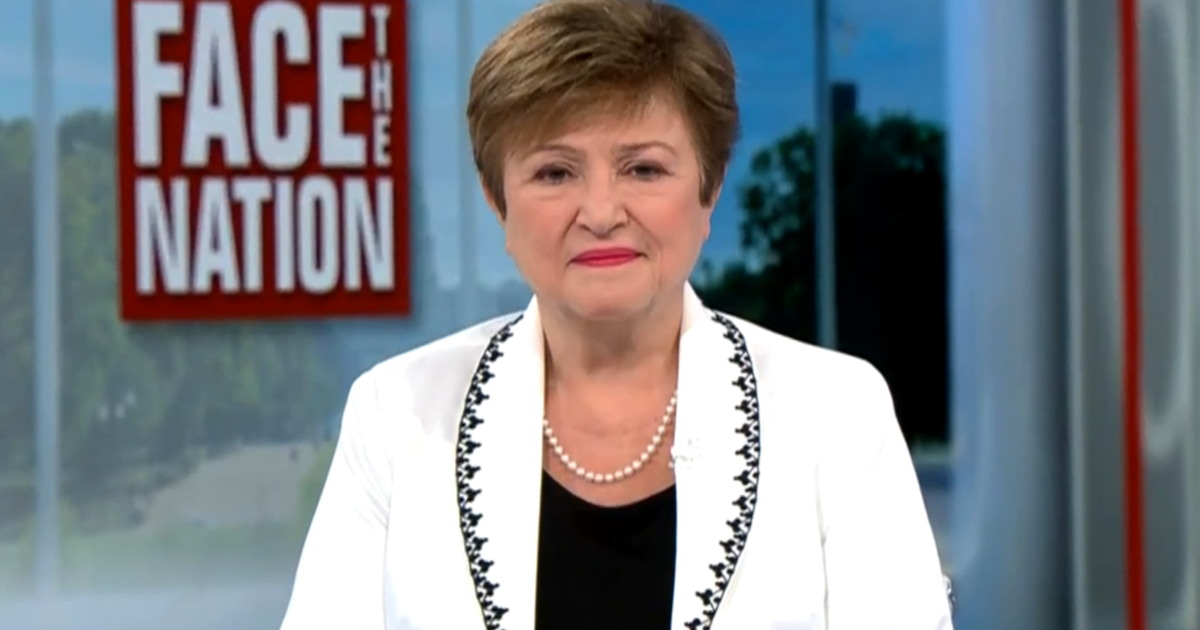
Transcript: IMF director Kristalina Georgieva on "Face the Nation," April 14, 2024
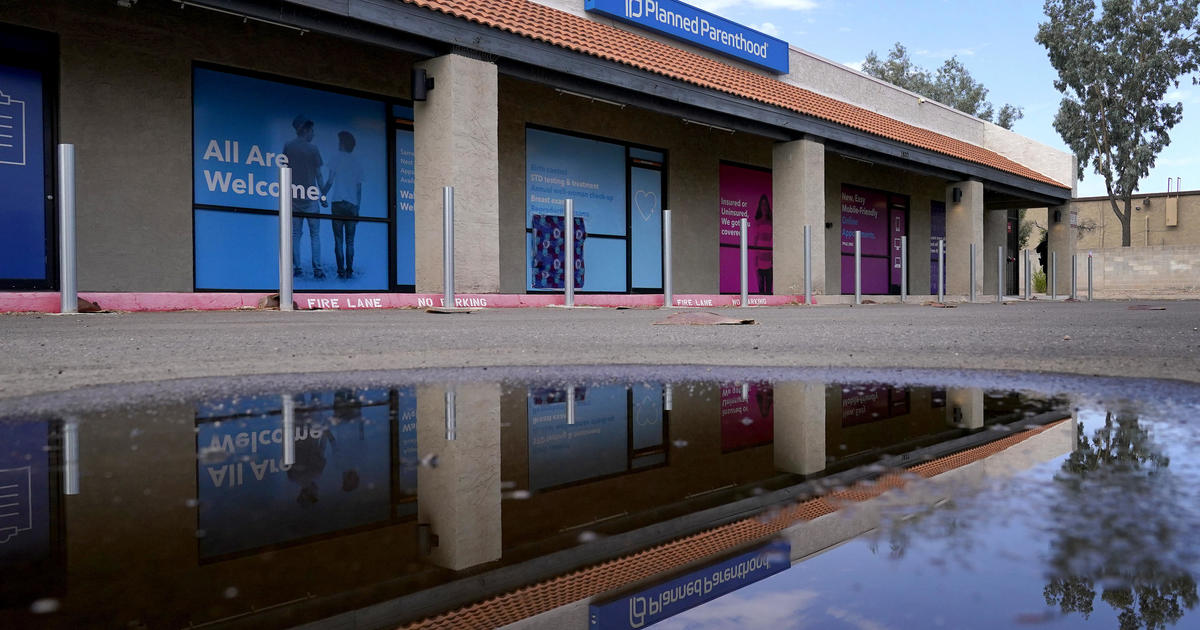
Arizona's abortion ban likely to cause people to travel to states it's still legal

Inflation's rising. Here's how debt relief can help.
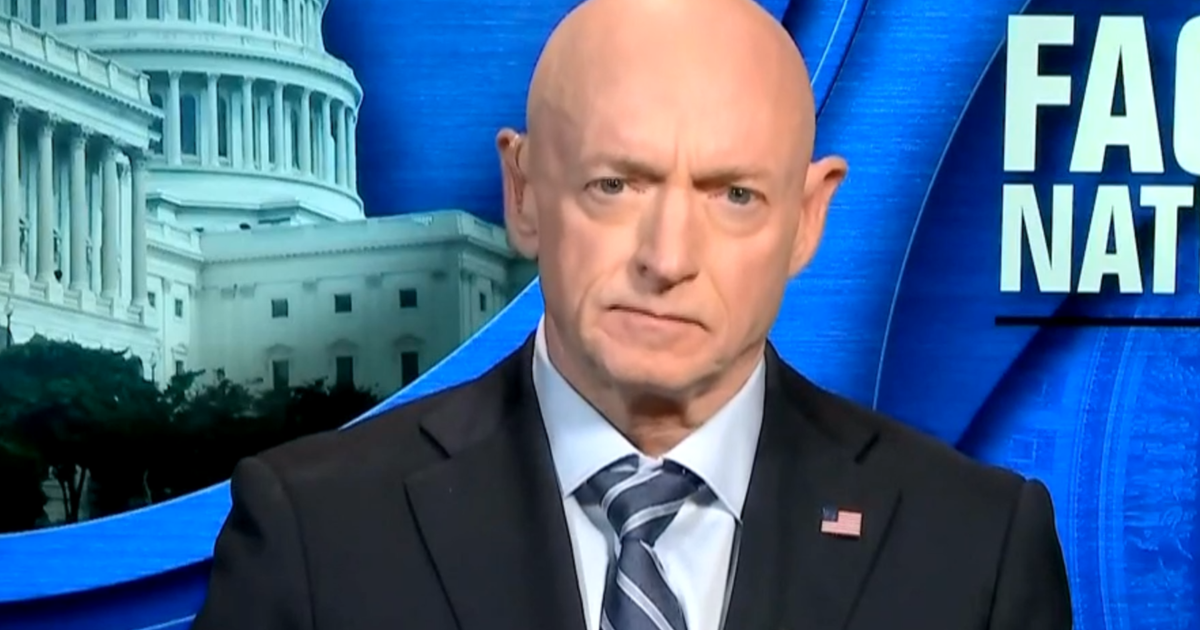
Transcript: Sen. Mark Kelly on "Face the Nation," April 14, 2024
AI Index Report
The AI Index Report tracks, collates, distills, and visualizes data related to artificial intelligence. Our mission is to provide unbiased, rigorously vetted, broadly sourced data in order for policymakers, researchers, executives, journalists, and the general public to develop a more thorough and nuanced understanding of the complex field of AI. The report aims to be the world’s most credible and authoritative source for data and insights about AI.
Subscribe to receive the 2024 report in your inbox!

Coming Soon: 2024 AI Index Report!
The 2024 AI Index Report will be out April 15! Sign up for our mailing list to receive it in your inbox.
Steering Committee Co-Directors

Ray Perrault
Steering committee members.

Erik Brynjolfsson

John Etchemendy

Katrina Ligett

Terah Lyons

James Manyika

Juan Carlos Niebles

Vanessa Parli

Yoav Shoham

Russell Wald
Staff members.

Loredana Fattorini

Nestor Maslej
Letter from the co-directors.
AI has moved into its era of deployment; throughout 2022 and the beginning of 2023, new large-scale AI models have been released every month. These models, such as ChatGPT, Stable Diffusion, Whisper, and DALL-E 2, are capable of an increasingly broad range of tasks, from text manipulation and analysis, to image generation, to unprecedentedly good speech recognition. These systems demonstrate capabilities in question answering, and the generation of text, image, and code unimagined a decade ago, and they outperform the state of the art on many benchmarks, old and new. However, they are prone to hallucination, routinely biased, and can be tricked into serving nefarious aims, highlighting the complicated ethical challenges associated with their deployment.
Although 2022 was the first year in a decade where private AI investment decreased, AI is still a topic of great interest to policymakers, industry leaders, researchers, and the public. Policymakers are talking about AI more than ever before. Industry leaders that have integrated AI into their businesses are seeing tangible cost and revenue benefits. The number of AI publications and collaborations continues to increase. And the public is forming sharper opinions about AI and which elements they like or dislike.
AI will continue to improve and, as such, become a greater part of all our lives. Given the increased presence of this technology and its potential for massive disruption, we should all begin thinking more critically about how exactly we want AI to be developed and deployed. We should also ask questions about who is deploying it—as our analysis shows, AI is increasingly defined by the actions of a small set of private sector actors, rather than a broader range of societal actors. This year’s AI Index paints a picture of where we are so far with AI, in order to highlight what might await us in the future.
- Jack Clark and Ray Perrault
Our Supporting Partners

Analytics & Research Partners

Stay up to date on the AI Index by subscribing to the Stanford HAI newsletter.
- SUGGESTED TOPICS
- The Magazine
- Newsletters
- Managing Yourself
- Managing Teams
- Work-life Balance
- The Big Idea
- Data & Visuals
- Reading Lists
- Case Selections
- HBR Learning
- Topic Feeds
- Account Settings
- Email Preferences
4 Reasons Why Managers Fail
- Swagatam Basu,
- Atrijit Das,
- Vitorio Bretas,
- Jonah Shepp

Nearly half of all managers report buckling under the stress of their role and struggling to deliver.
Gartner research has found that managers today are accountable for 51% more responsibilities than they can effectively manage — and they’re starting to buckle under the pressure: 54% are suffering from work-induced stress and fatigue, and 44% are struggling to provide personalized support to their direct reports. Ultimately, one in five managers said they would prefer not being people managers given a choice. Further analysis found that 48% of managers are at risk of failure based on two criteria: 1) inconsistency in current performance and 2) lack of confidence in the manager’s ability to lead the team to future success. This article offers four predictors of manager failure and offers suggestions for organizations on how to address them.
The job of the manager has become unmanageable. Organizations are becoming flatter every year. The average manager’s number of direct reports has increased by 2.8 times over the last six years, according to Gartner research. In the past few years alone, many managers have had to make a series of pivots — from moving to remote work to overseeing hybrid teams to implementing return-to-office mandates.
- Swagatam Basu is senior director of research in the Gartner HR practice and has spent nearly a decade researching leader and manager effectiveness. His work spans additional HR topics including learning and development, employee experience and recruiting. Swagatam specializes in research involving extensive quantitative analysis, structured and unstructured data mining and predictive modeling.
- Atrijit Das is a senior specialist, quantitative analytics and data science, in the Gartner HR practice. He drives data-based research that produces actionable insights on core HR topics including performance management, learning and development, and change management.
- Vitorio Bretas is a director in the Gartner HR practice, supporting HR executives in the execution of their most critical business strategies. He focuses primarily on leader and manager effectiveness and recruiting. Vitorio helps organizations get the most from their talent acquisition and leader effectiveness initiatives.
- Jonah Shepp is a senior principal, research in the Gartner HR practice. He edits the Gartner HR Leaders Monthly journal, covering HR best practices on topics ranging from talent acquisition and leadership to total rewards and the future of work. An accomplished writer and editor, his work has appeared in numerous publications, including New York Magazine , Politico Magazine , GQ , and Slate .
Partner Center
Read our research on: Gun Policy | International Conflict | Election 2024
Regions & Countries
About 1 in 4 u.s. teachers say their school went into a gun-related lockdown in the last school year.
Twenty-five years after the mass shooting at Columbine High School in Colorado , a majority of public K-12 teachers (59%) say they are at least somewhat worried about the possibility of a shooting ever happening at their school. This includes 18% who say they’re extremely or very worried, according to a new Pew Research Center survey.
Pew Research Center conducted this analysis to better understand public K-12 teachers’ views on school shootings, how prepared they feel for a potential active shooter, and how they feel about policies that could help prevent future shootings.
To do this, we surveyed 2,531 U.S. public K-12 teachers from Oct. 17 to Nov. 14, 2023. The teachers are members of RAND’s American Teacher Panel, a nationally representative panel of public school K-12 teachers recruited through MDR Education. Survey data is weighted to state and national teacher characteristics to account for differences in sampling and response to ensure they are representative of the target population.
We also used data from our 2022 survey of U.S. parents. For that project, we surveyed 3,757 U.S. parents with at least one child younger than 18 from Sept. 20 to Oct. 2, 2022. Find more details about the survey of parents here .
Here are the questions used for this analysis , along with responses, and the survey methodology .
Another 31% of teachers say they are not too worried about a shooting occurring at their school. Only 7% of teachers say they are not at all worried.
This survey comes at a time when school shootings are at a record high (82 in 2023) and gun safety continues to be a topic in 2024 election campaigns .
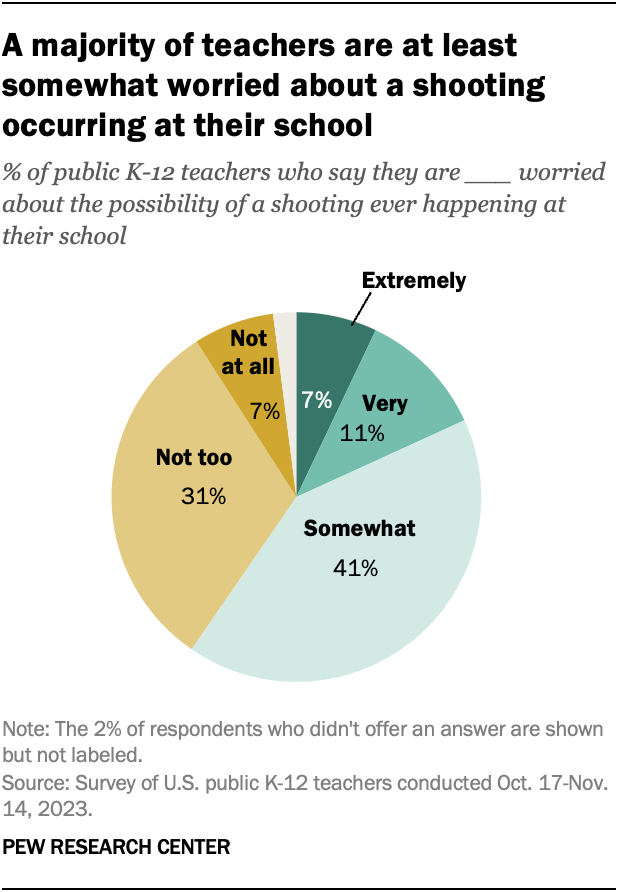
Teachers’ experiences with lockdowns
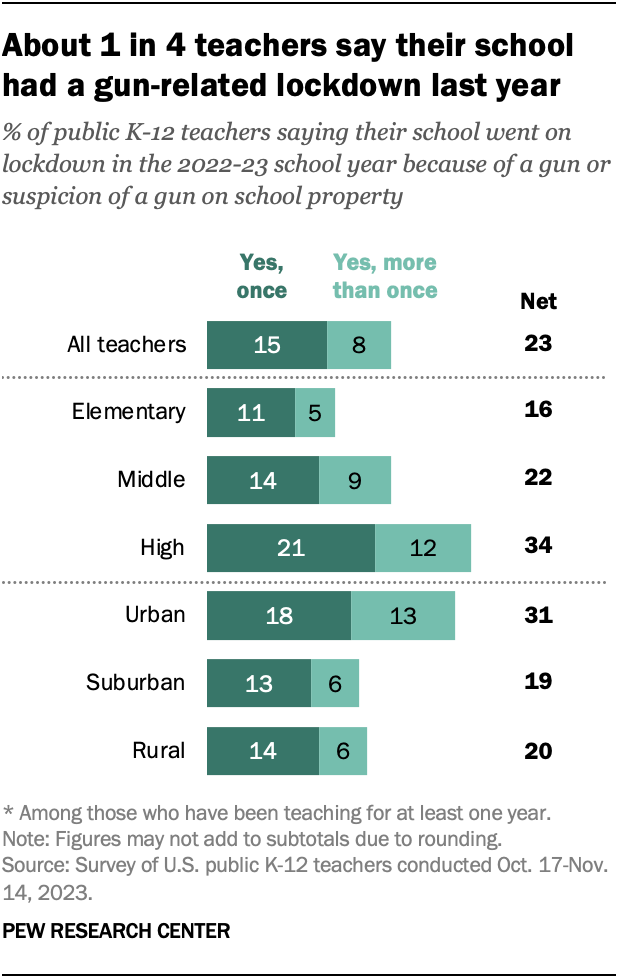
About a quarter of teachers (23%) say they experienced a lockdown in the 2022-23 school year because of a gun or suspicion of a gun at their school. Some 15% say this happened once during the year, and 8% say this happened more than once.
High school teachers are most likely to report experiencing these lockdowns: 34% say their school went on at least one gun-related lockdown in the last school year. This compares with 22% of middle school teachers and 16% of elementary school teachers.
Teachers in urban schools are also more likely to say that their school had a gun-related lockdown. About a third of these teachers (31%) say this, compared with 19% of teachers in suburban schools and 20% in rural schools.
Do teachers feel their school has prepared them for an active shooter?
About four-in-ten teachers (39%) say their school has done a fair or poor job providing them with the training and resources they need to deal with a potential active shooter.
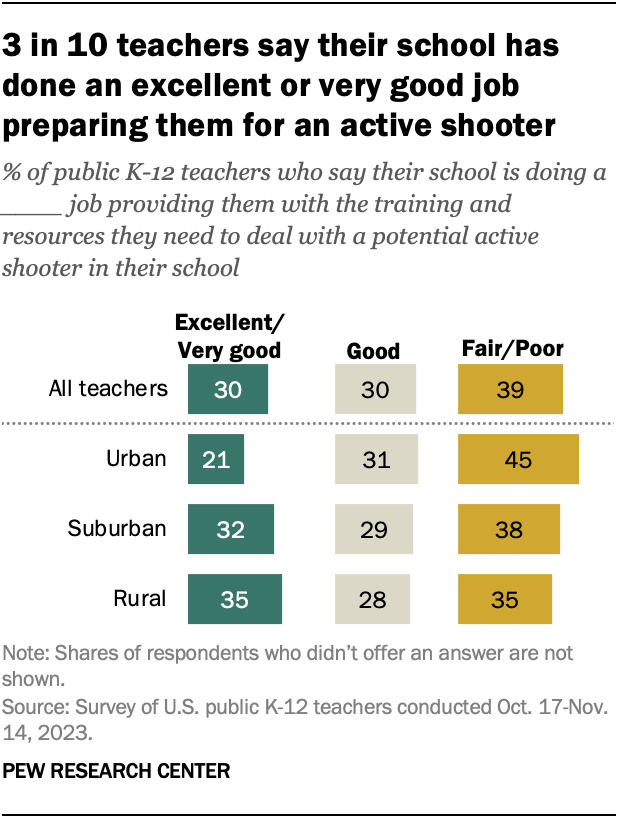
A smaller share (30%) give their school an excellent or very good rating, and another 30% say their school has done a good job preparing them.
Teachers in urban schools are the least likely to say their school has done an excellent or very good job preparing them for a potential active shooter. About one-in-five (21%) say this, compared with 32% of teachers in suburban schools and 35% in rural schools.
Teachers who have police officers or armed security stationed in their school are more likely than those who don’t to say their school has done an excellent or very good job preparing them for a potential active shooter (36% vs. 22%).
Overall, 56% of teachers say they have police officers or armed security stationed at their school. Majorities in rural schools (64%) and suburban schools (56%) say this, compared with 48% in urban schools.
Only 3% of teachers say teachers and administrators at their school are allowed to carry guns in school. This is slightly more common in school districts where a majority of voters cast ballots for Donald Trump in 2020 than in school districts where a majority of voters cast ballots for Joe Biden (5% vs. 1%).
What strategies do teachers think could help prevent school shootings?
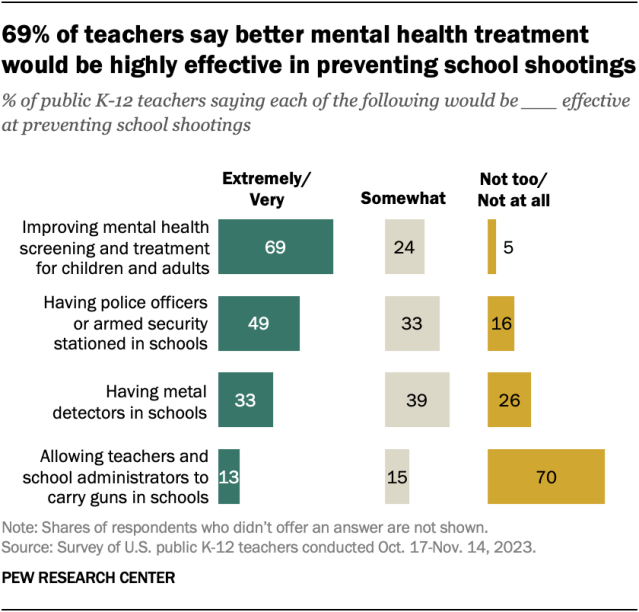
The survey also asked teachers how effective some measures would be at preventing school shootings.
Most teachers (69%) say improving mental health screening and treatment for children and adults would be extremely or very effective.
About half (49%) say having police officers or armed security in schools would be highly effective, while 33% say the same about metal detectors in schools.
Just 13% say allowing teachers and school administrators to carry guns in schools would be extremely or very effective at preventing school shootings. Seven-in-ten teachers say this would be not too or not at all effective.
How teachers’ views differ by party
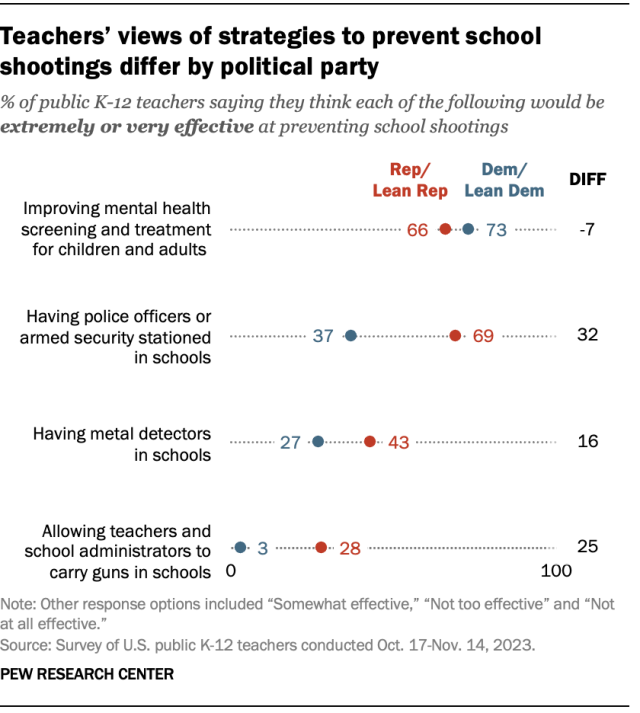
Republican and Republican-leaning teachers are more likely than Democratic and Democratic-leaning teachers to say each of the following would be highly effective:
- Having police officers or armed security in schools (69% vs. 37%)
- Having metal detectors in schools (43% vs. 27%)
- Allowing teachers and school administrators to carry guns in schools (28% vs. 3%)
And while majorities in both parties say improving mental health screening and treatment would be highly effective at preventing school shootings, Democratic teachers are more likely than Republican teachers to say this (73% vs. 66%).
Parents’ views on school shootings and prevention strategies
In fall 2022, we asked parents a similar set of questions about school shootings.
Roughly a third of parents with K-12 students (32%) said they were extremely or very worried about a shooting ever happening at their child’s school. An additional 37% said they were somewhat worried.
As is the case among teachers, improving mental health screening and treatment was the only strategy most parents (63%) said would be extremely or very effective at preventing school shootings. And allowing teachers and school administrators to carry guns in schools was seen as the least effective – in fact, half of parents said this would be not too or not at all effective. This question was asked of all parents with a child younger than 18, regardless of whether they have a child in K-12 schools.
Like teachers, parents’ views on strategies for preventing school shootings differed by party.
Note: Here are the questions used for this analysis , along with responses, and the survey methodology .

Sign up for our weekly newsletter
Fresh data delivered Saturday mornings
‘Back to school’ means anytime from late July to after Labor Day, depending on where in the U.S. you live
Among many u.s. children, reading for fun has become less common, federal data shows, most european students learn english in school, for u.s. teens today, summer means more schooling and less leisure time than in the past, about one-in-six u.s. teachers work second jobs – and not just in the summer, most popular.
About Pew Research Center Pew Research Center is a nonpartisan fact tank that informs the public about the issues, attitudes and trends shaping the world. It conducts public opinion polling, demographic research, media content analysis and other empirical social science research. Pew Research Center does not take policy positions. It is a subsidiary of The Pew Charitable Trusts .

IMAGES
VIDEO
COMMENTS
Lastly, as a result of preparing the Research Report my professional interest on the issues associated with corporate strategy has been enhanced. Moreover, I am planning to continue studying the issues of corporate strategy and that knowledge would benefit me in the future as a corporate leader. 5. Gains derived from conducting Research Report ...
Reflection is a very important mental activity, both in private and professional life. This study assumes that reflection is "a turning back onto a self" where the inquirer is at once an observed and an active observer (Steier, 1995, p. 163).Reflection aims at understanding the forms of intelligibility by which the world is made meaningful; in the heuristic context of the research work ...
Your reflection may include quotes and passages if you are writing about a book or an academic paper. They give your reader a point of reference to fully understand your feedback. Feel free to describe what you saw, what you heard, and how you felt. Example: "I saw many people participating in our weight experiment.
Your essay should be 500 to 750 words. • Use the reflective essay to communicate specifics about your improved understanding and use of library services, resources, and collections as they applied to your paper or project. • Explain what advancements you see in your library research and what skills, techniques or strategies you have learned.
Sample Research Project in the Context of a Freshman Writing Course Prepared by Steve Tollefson, College Writing Programs, UC Berkeley, 2005 Includes Final Research Paper, Annotated Bibliography and Reflection on the Process Internalizing Dead Kings and Ambiguous Art Marian Feldman has been a member of the UC Berkeley faculty for
Use these 5 tips to write a thoughtful and insightful reflection paper. 1. Answer key questions. To write a reflection paper, you need to be able to observe your own thoughts and reactions to the material you've been given. A good way to start is by answering a series of key questions. For example:
Reflection Paper. Cordia Harrington Center for Excellence, University of Arkansas; Ramlal, Alana, and Désirée S. Augustin. "Engaging Students in Reflective Writing: An Action Research Project." Educational Action Research 28 (2020): 518-533; Writing a Reflection Paper. Writing Center, Lewis University; McGuire, Lisa, Kathy Lay, and Jon ...
1. Keep it short and sweet. A typical reflection paper is between 300 and 700 words long. Verify whether or not your instructor specified a word count for the paper instead of merely following this average. If your instructor demands a word count outside of this range, meet your instructor's requirements. 2.
Both the language and the structure are important for academic reflective writing. For the structure you want to mirror an academic essay closely. You want an introduction, a main body, and a conclusion. Academic reflection will require you to both describe the context, analyse it, and make conclusions. However, there is not one set of rules ...
A research report is one big argument about how and why you came up with your conclusions. To make it a convincing argument, a typical guiding structure has developed. ... The critical reflection of other's research studies and your findings in the light of what other researchers found out is an essential and integral part of your report ...
Here are steps you can follow: 1. Understand and summarize the material. It's important that you review the material before writing the reflection paper. You can review similar texts and authorities to help you understand the content of the text. Some reflection papers may require you to review a particular event.
Reflexivity is a vital part of qualitative research, as it is an important concept in discussions on subjectivity, objectivity and social science knowledge and research. 294. (Hsiung, 2008). One of the most important aspects of reflexivity is that it highlights possible researcher bias in qualitative research (Pillow, 2003; Pullen, 2006) which ...
3. The Discussion section. This will summarize the important parts of the Results section (perfect for the summary section of your paper), tell you the limitations of the study (this will become very important in your reflection) and provide directions for future research (also important for your reflection).
Here are some examples of reflective reports: Sage, UNSW, and Monash University. The models provide some ideas and can be use to guide your work. It is a written report that summarises the critical reflection of a person. A reflective report is a written document summarising a person's critical reflection on an experience or a particular topic.
Research Paper Reflection. In the research paper, I can feel my biggest change is in dealing with the structure of the whole article. The structure of the essay is already mentioned in the introduction part, so the next step is to follow the structure I have made. In other words, each part, as well as each title of paragraphs of the essay ...
Reflective reports are written to explain your experiences concisely and informally. They should be written like short essays and be structured as separate sections. Unlike articles, however, reports are more practical and should focus on lessons learned. The descriptions of situations and feelings should be brief, and the main lessons learned ...
Craft an Introduction. Hook the Reader: Open the sentence with some catchy and attention-grabbing words. Make the Context: Provide brief background data related to your topic that make a context. Define Your Thesis Statement: Use simple and clear words to highlight your main points of reflection.
January 2008. In book: Knowing Differently: Arts-Based and Collaborative Research Methods (pp.265-280) Chapter: Critical Reflection as a Research Methodology. Publisher: Nova Science Publishers ...
In this section we will provide a brief overview of action research, emphasize the importance. of reflection in the methodology and present a summar y of Donald Schön's work on. reflection-in ...
Recently, I practically utilized these strategies while preparing a research paper on the impact of social factors on high school dropouts. By utilizing these newly learned search techniques, I accessed a range of important journals and authoritative publications that I was previously unaware of. ... ← Module 5: Reflection on "Web-Enhanced ...
Research on student reflection emphasizes the need for guided support, whether by the instructor or a mentor (Gardner & Belland, ... (2015). Collaborative teaching practices in undergraduate active learning classrooms: A report of faculty team teaching models and student reflections from two biology courses. Bioscene, 41(1), 3-9. Google Scholar.
Lesson learned: **I came to realize that research is a journey and if you want good results, you shouldn't skip any step. It's a journey where you keep learning and bringing new ideas to your project. Throughout the journey, I learnt new theories and I learnt why some of them couldn't work. **I also learnt that you shouldn't rely on one online ...
Our samples. Now you know the purpose of reflective reports, look at the samples published on the site. You'll see that these samples include the critical evaluation of events and a description of how you can apply what you learned to similar future situations. Examining our samples will help you in writing and submitting an outstanding ...
How to Write a Good Reflective Report. Be critical. Although the content of a reflective portfolio will be more personalised than other assignments, you should use the same level of critical analysis as you do for any essay or exam. Be thorough. Make sure that you write about all the stages of your project, from the planning phases through to ...
arXiv.org
Why looking directly at a solar eclipse is so dangerous for your eyes 01:41. The solar eclipse will be visible for millions of Americans on April 8, 2024, making many excited to see it — but how ...
The AI Index Report tracks, collates, distills, and visualizes data related to artificial intelligence. Our mission is to provide unbiased, rigorously vetted, broadly sourced data in order for policymakers, researchers, executives, journalists, and the general public to develop a more thorough and nuanced understanding of the complex field of AI.
The Agency for Healthcare Research and Quality (AHRQ) Making Healthcare Safer (MHS) reports consolidate information for healthcare providers, health system administrators, researchers, and government agencies about practices that can improve patient safety across the healthcare system — from hospitals to primary care practices, long-term care facilities, and other healthcare settings.
The job of the manager has become unmanageable. Organizations are becoming flatter every year. The average manager's number of direct reports has increased by 2.8 times over the last six years ...
High school teachers are most likely to report experiencing these lockdowns: 34% say their school went on at least one gun-related lockdown in the last school year. This compares with 22% of middle school teachers and 16% of elementary school teachers. Teachers in urban schools are also more likely to say that their school had a gun-related ...